Without further ado, we present the Top 100 Films of the 2010s
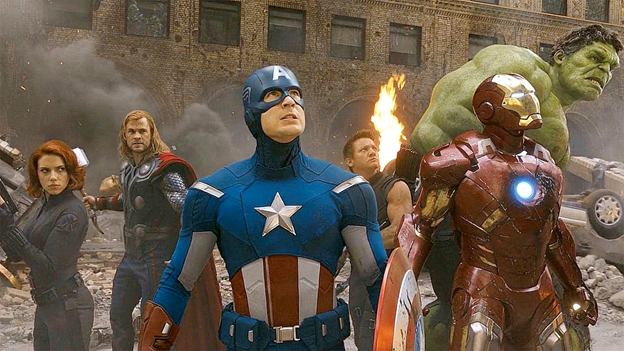
100. THE AVENGERS / Joss Whedon / 2012
Genre: Action / Superhero
In some ways a cumulative inclusion in the list: But considering that a number of our writers voted for disparate Marvel releases, it only seems right to include THE AVENGERS, Joss Whedon’s first team-up extravaganza, in the top 100, the film that set the narrative and stylistic precedent for much of the ensuing canon and shaped much of blockbuster cinema for the 2010s. When I left the theater after seeing THE AVENGERS, I felt a sense of joy and fulfillment that I hadn’t felt since RETURN OF THE KING. This was a culmination of years of world-building and character development that all crescendoed into a spectacle of witty banter, stunning action, and crowd-pleasing moments. The idea of bringing several heroes together across six films seemed impossible, and yet Whedon accomplished this with ease, delivering a film oozing with heart and charm that made it the summer blockbuster we had been waiting for. Although later Avengers films deliver stronger action and higher stakes, nothing compares to the first time seeing all of these comic book icons band together to defeat a common foe. [Daniel Brian Foster]

99. BOYHOOD / Richard Linklater / 2014
Genre: Drama
I watched my life pass by my very eyes. Perhaps it wasn’t Phoenix, Arizona—it was Austin. And perhaps my parents didn’t get divorced—although they almost did. But the trips to the ballpark with my dad, the swimming in the creek during a hot summer, the first beer, the lingering middle class anxiety, the music, the technology, even the fashion? That was my life in some capacity. Ellar Coltrane is two years younger than me, but I remember all the moments of BOYHOOD as though Richard Linklater were filming my own life for 12 years. Putting the sheer ambition of the project aside (although the sheer ambition alone should land it on this list), there is an authentic, if unwieldy and understandably uncertain, tone to BOYHOOD that is simply unparalleled in coming-of-age stories, because the future truly does feel unknown. Linklater’s humanist instincts capture something magical (if specific) throughout BOYHOOD, and even if it’s mostly commended for the breadth of scale more than its actual narrative (or lack thereof), it captures the 2000s to early 2010s more authentically than just about any documentary ever could. [CJ Simonson]
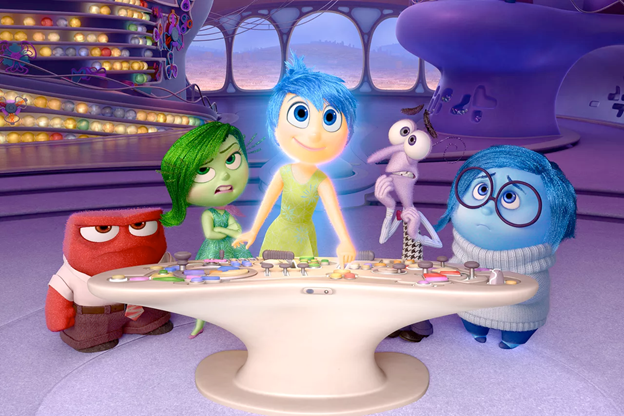
98. INSIDE OUT / Pete Docter and Ronnie Del Carmen / 2015
Genre: Comedy
I want to say that Pixar had a banner decade, but then again it seems that they’ve never really had a bad one; nor will they ever. Unlike many live-action studios of the same stature, the animation monolith has consistently and successfully managed to thread the needle between technical craftsmanship and great storytelling. Where studio blockbusters often lack in the latter department, Pixar has always been a reliable ally. As such, it’s well-known that the people who work at Pixar foster a legacy of heartwrenching—and heartwarming—stories, but none quite match the genuine wonder, imagination, and awe of INSIDE OUT. It encapsulates childhood in a way that is universal and appeals to all, while also sparking conversations about mental illness, emotional imbalance, and behavioral disorders. It’s one of very few animated films that feels personal, tailored to each and every viewer. For once, there’s no villain—the antagonist is change. Is life itself. Which, in my opinion, makes it the most honest and universal animated film of the decade, if not of all time. [Tracy Nicoletti]
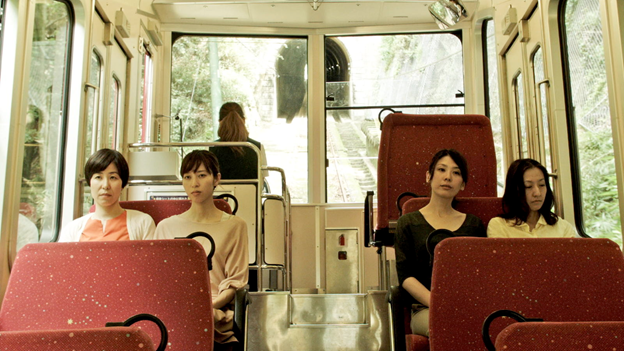
97. HAPPY HOUR / Ryûsuke Hamaguchi / 2015
Genre: Drama
For its length (317 mins) and rather muted tone, HAPPY HOUR never drags—Hamaguchi’s approach to setpieces evokes the fluid staging and narratology of Cassavetes, but HAPPY HOUR is perhaps more introverted than that comparison would suggest. Four childhood friends, now in their 30s, go through an emotional whirlwind when the eccentric Jun suffers a devastating defeat in divorce court and suddenly disappears, leaving the women to examine their relationships with her—and with one another. Hamaguchi’s camera is patient, nearly always static, and unintrusive. He’s an extraordinary listener, tuning into frank, authentic conversations about sexuality, and honing in, perhaps surprisingly, on the body (a 40-minute-long meditation workshop sequence is one of the stand-outs). Hamaguchi understands that the body is always limiting, that we cannot escape it through any possible intervention, but he also recognizes that deep within your guts lies the truth. [Luka Stojcic]
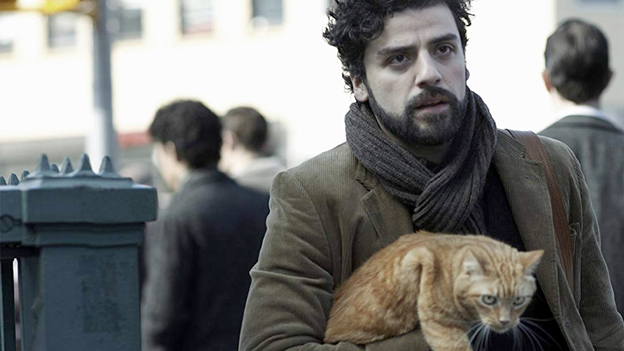
96. INSIDE LLEWLYN DAVIS / Joel and Ethan Coen / 2013
Genre: Drama
It’s easy enough to make a film about a success—there’s conventions in place to tell a convincing story about those who achieve. To tell a story about an outright failure is a far more nuanced, complex feat. INSIDE LLEWYN DAVIS follows the titular Llewyn as his music career falters in the wake of his partner’s death. Joel and Ethan Coen have mastered the story of the antihero, but Oscar Isaac’s Llewyn is neither hero, nor antihero, nor villain. He’s just a guy who can’t seem to stop fucking up. It’s his music that is the draw—as stressed as you are by his actions, you cannot help but feel every ounce of his pain via the folk music he croons on every stop of his journey. The entire film rests on Isaac, a relatively unknown actor at the time of its 2013 release, and he carries it effortlessly. INSIDE LLEWYN DAVIS is the antithesis to O! BROTHER WHERE ART THOU, it is the inverse ODYSSEY. A tale of how devastatingly easy it is not to change, how tiresome it is to exist. Additionally, this gave us Adam Driver howling “UH OH” on the masterpiece, “Please Mr. Kennedy.” What more could you ask for. [Aya Lehman]
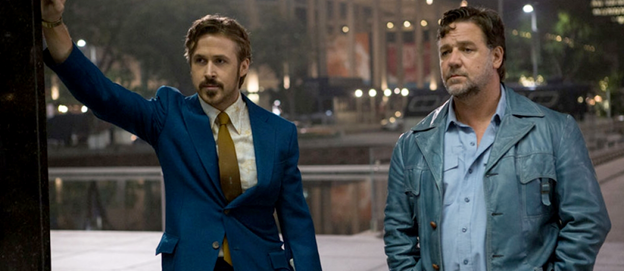
95. THE NICE GUYS / Shane Black / 2016
Genre: Comedy
I can’t tell you how many times I’ve seen THE NICE GUYS, but what I can tell you is that the first time I saw it, it immediately became one of those movies that I will drop everything to watch. Ryan Gosling is hilarious and Russell Crowe is himself as an unlikely pair of PIs investigating the disappearance of a teenage girl—a case which quickly balloons into an absurd conspiracy involving automakers, government officials, and, well, porn. Set after the gravest recession since the (temporary) shift from war to peacetime economy following WWII, Black turns his lens to a time when the grim specter of Nixon still loomed in the smog-choked sky and duplicitous glad-hands were hard at work rebranding the US as “Corporate America.” Sure, Black mines much of the same neo-noir, buddy comedy territory of 2005’s KISS KISS BANG BANG, but by transposing his usual bag of tricks to the sleaze-cauldron of 1977 Los Angeles, he is able to bring to light some of the more unsavory aspects of the present day without, say, shooting himself twice in the back of the head. Did I mention it’s really funny? [Joseph Simpson]

94. EMBRACE OF THE SERPENT / Ciro Guerra / 2015
Genre: Drama
Colombia’s first film to be considered for an Academy Award, a lot of comparisons to APOCALYPSE NOW and AGUIRRE, THE WRATH OF GOD were tossed around about EMBRACE OF THE SERPENT at the time of its release. But apart from the fact that all three films make heavy practical and thematic use out of the jungle, it’s a bit of a disservice to Guerra’s third feature considering it operates entirely on its own level. Despite the clearly identifiable backdrop of rubber-influenced colonialism draping over the entire proceedings, EMBRACE OF THE SERPENT is never the film you expect it to be, and occasionally isn’t the film you want it to be. A twisting journey as thick and heady as the jungle our main characters travel through, often just as knotted and labyrinthine, the film is hard to pin down. On one hand, it’s a straightforward adventure story, on the other hand, it’s a dreamlike reverie through some of the most captivating imagery of the decade, with the languid rivers and humming wildlife that Karamakate and company trek through as welcoming as they are alien and intimidating. [Thomas Seraydarian]

93. BEASTS OF THE SOUTHERN WILD / Benh Zeitlin / 2012
Genre: Drama
For many, BEASTS is an enigma. At the time of its release, no one had heard of the cast, crew, or director. Shot in rural Louisiana, the film stands as something more similar to poetry with its imagery, beautiful score, and plot weaving together a rich tapestry of magic realism, natural forces, and forgotten America. Suddenly, in 2012 it blazed onto the scene. Winning countless awards including the dramatic Grand Jury Prize at Sundance 2012 and several Academy Award nominations, it cut through the blockbusters and “Oscar-bait” films of the year and heavily resonated with audiences. Also, uh… Obama has called it “spectacular.” Some criticized the film for being demeaning to rural people throughout the country, but the film handles itself with empathy and artistry without relying on the squalor of its subjects to hook audiences. Playing “hushpuppy”, six-year-old star Quvenzhané Wallis gives one of the greatest child performances on screen with heartbreaking realism and an intensity that most adult actors would be lucky to achieve. [Sam Wall]
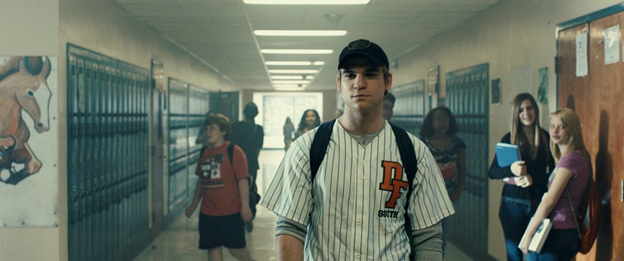
92. THE IMPOSTER / Bart Layton / 2012
Genre: Documentary
There are amazing actors all around us who will just never get a chance to star in a major motion picture. If you have these skills but have never actually ended up in front of a casting director, it turns out that the instincts that make a person a good actor also can make them an incredibly effective liar. The stranger-than-fiction tale of Frédéric Bourdin, a master impersonator who claims to have assumed the identities of 500 different people over the course of his life, is simultaneously electrifying and confounding. In particular, the tale of how Bourdin was able to pretend to be a 16-year-old missing boy from Texas when he was picked up by police on the streets of Spain is nothing short of jaw-dropping. Bart Layton’s masterful unspooling of a story of deception, murder, and grief stretches the imagination and creates a chilling reminder of just how easily any of us can be manipulated in the right circumstances. The narrative twists in this documentary, the ways in which Layton manages to make you feel as though the rug is constantly being pulled out from underneath you for almost the entire runtime of the film, is a delicate hat-trick few films, narrative or documentary, can ever achieve. A brutal interrogation of what reality even is, a meta examination of what it means to act and put stories into cinematic form, THE IMPOSTER left an indelible mark. [Carter Moon]
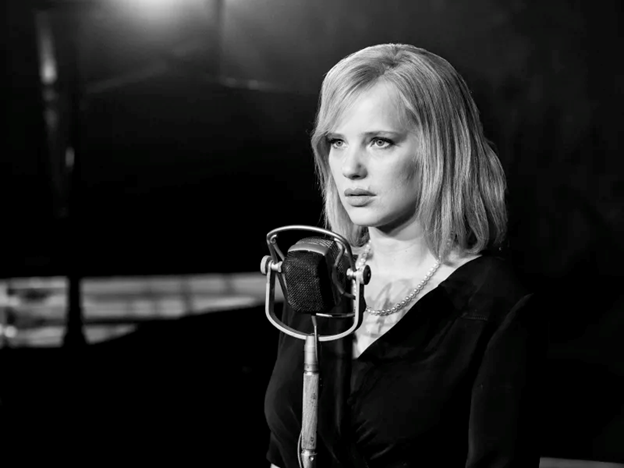
91. COLD WAR / Paweł Pawlikowski / 2018
Genre: Romance
A would-be three-hour romance epic expertly and elliptically whittled down to less than 90 minutes. The cinematic equivalent of listening to jazz in an ice-cold bathtub of vodka. A film that plays like memory scanning through 15 years, and gives new meaning to the common phrase “it feels like only yesterday…” Time passes, innocence is shed (not to mention hair), politics and circumstances grow harsh—but Tomasz Kot and Joanna Kulig continuously smolder with a crimson passion that transcends the inky black and white images that immortalize them. Together, they possess an organic magnetism that mirrors how their characters are compelled to find each other again and again until they reach their inevitable end. This is a film that can sit on the shelves of the foreign film DVD section of your local library and hold its own against the classics without batting an eye. The final two shots (in the church and in the field) have been burned into memory since I saw it over a year ago, and many nights have made me retroactively weep at their hard-edged beauty. [Reid Antin]
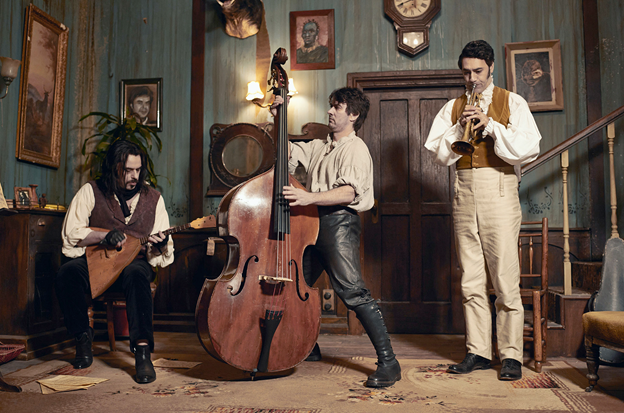
90. WHAT WE DO IN THE SHADOWS / Jemaine Clement and Taika Waititi / 2014
Genre: Mocumentary / Comedy
The start of this decade caught the tail end of the mockumentary craze, most often linked with the horror or cringe comedy genres. Throw in another early 2010s craze—vampires—and you get WHAT WE DO IN THE SHADOWS. It’s pretty incredible that two genres that were pretty tired at that point were made to feel so fresh and entertaining. The premise is quite simple: a group of vampire roommates give the viewer a tour of their everyday lives. We are treated to every type of vampire, from the Nosferatu-type to the Twilight-type, and just seeing these supernatural creatures live out the mundanity of life is such simple yet effective comedy. It is quite possibly the most perfect spoof movie ever made. A few years removed from its release and WHAT WE DO IN THE SHADOWS definitely holds up to a second, third, or fourth viewing. It’s also a TV show now and Taika Waititi is a household name, so it’s a fun one to revisit. [Nadia Hayford]
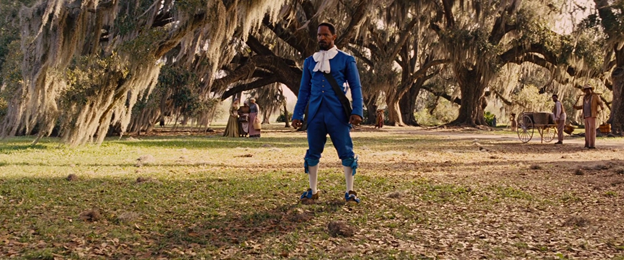
89. DJANGO UNCHAINED / Quentin Tarantino / 2012
Genre: Western
A post-modern slavery film (a year before the straight-faced 12 YEARS A SLAVE even came out to be subverted, mind you). A touching and funny buddy comedy. A love story. An epic Homeric odyssey by turns cartoonish yet deadly serious. There is no other film like DJANGO UNCHAINED. To boot, it even serves as the showcase for Samuel L. Jackson’s most sinister performance, which is certainly no small statement. Like a great album, you could only watch a single scene as if it were a song—the cotton field shooting of the Brittle Brothers, the “I Got a Name” training montage, the arrival at Candyland, the dinner table scene, the climactic shootout (both of them)—and lock into their respective umami-rich sights and sounds to achieve an entire afternoon’s worth of cinematic pleasure. For all of its momentary influences rooted in a deep knowledge of cinematic history, it could only have come from the singular mind of Quentin Tarantino. It is the definition of an auteurist genre film—the realization of what Cahiers du Cinema critics were dreaming about as they praised the inklings of genius in B-pictures by Nicholas Ray and Howard Hawks. [Reid Antin]
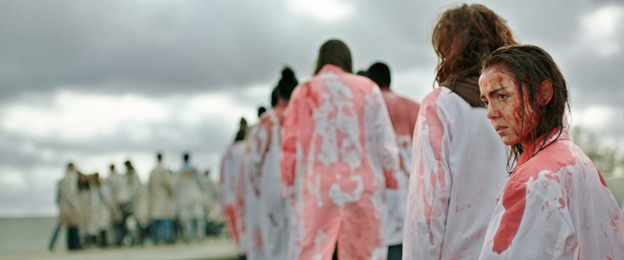
88. RAW / Julia Ducournau / 2016
Genre: Horror
Am I the only one who remembers when RAW came out and theaters were “passing out barf bags” to viewers? Or the notoriety that the film was one of the hardest to stomach of all time? Female director Julia Ducournau shows a brilliant depiction of stakes in her 2017, pseudo-coming of age story, RAW. “Pseudo-” feels necessary, since young Justine seems to know herself rather well; it’s the insatiable lust for blood that she has to grapple with at veterinary school. The slow camera work and the increasingly stratified use of warm colors specifically red, is commendable, however, the screenplay itself is the highlight. A story about cannibalism with an undercurrent of family dynamics that tries to reject any trait of submissiveness in women by hyperbolically showing their savagery? That’s how you subvert the “women are healers” trope, folks. The icing on the cake is the idea that their hunger is an affliction. Two young women didn’t start making people crash their cars to feed on them because they’re cannibals, this is a hereditary disease that has sealed their fate the moment they were born to their mother. All in all, RAW is a multi-faceted stroke of genius that still harbors one of the most bone-chilling sex scenes you’ll ever see: an absolute must-watch! [Jesse Herb]
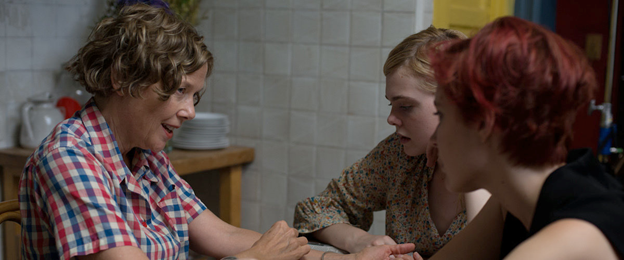
87. 20TH CENTURY WOMEN / Mike Mills / 2016
Genre: Drama
20TH CENTURY WOMEN changed how I spoke with my mother. To be blunt, 20TH CENTURY WOMEN pushed me to speak to my mother. It’s not that we never spoke, but we were never friends. She was not a person. She was my mom. I was not a person. I was her son. It’s a style she adopted from her mother, whom adopted it from her own. We sat together in December 2016 to watch 20TH CENTURY WOMEN together and for the whole ride home, we spoke with a newly forged wreckage of boundaries. Writer-director Mike Mills lets the rippling tides of history, personal and national, course through the walls of a Santa Barbara boarding house as three waves of feminism, or more aptly, perhaps, three categories of the same wave collide to both improve one another and an American boy. Anyone can celebrate, but Mills transcends a simple spotlight and actively encourages his viewer to practice tender, reflective empathy. Thoughtful, wonderful stuff that sits in my mind like a memory of my own; I’ll never properly be able to describe my own mother, either. [Kevin Cookman]
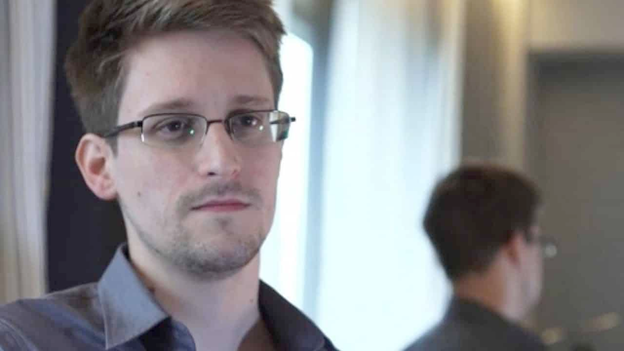
86. CITIZENFOUR / Laura Poitras / Documentary
Genre: Documentary
Every decade has a documentary that reflects the cultural moment, but few are as literally in-the-moment as Laura Poitras’ Edward Snowden document, CITIZENFOUR, a nail-biting thriller taking place days, nay, hours, nay, seconds before and after the American whistleblower’s massive data leak. Sequestered in a sterile hotel room, with nobody to talk to but Laura, CITIZENFOUR captures the anxiety of knowing that the world’s most powerful government (your own home country) is out to get you. It’s Coppola’s THE CONVERSATION but without a single layer of artifice, a spellbinding document of a decade where cyber warfare, drone strikes, and cell phone surveillance have reverted human lives to numbers on a stat chart. Perhaps more than any film this decade, it is a sobering reminder of why we need people in our government who are willing to stand up and put their own lives and reputations on the line when they see their own governments committing a grave injustice. [Sergio Zaciu]
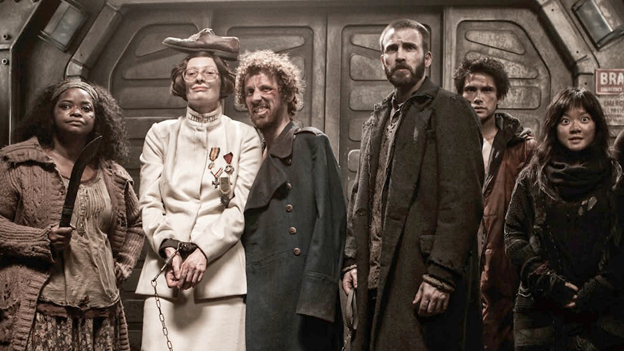
85. SNOWPIERCER / Bong Joon-ho / 2013
Genre: Sci-Fi
In the wake of a society Hellbent on making dystopia after dystopia while neglecting the one happening before us, SNOWPIERCER is one dystopia that provides an unexpected glimmer of solace. While it may feel odd to call a film like SNOWPIERCER escapist, it’s the only word I can use to sleep at night. It’s not just the concept of a train compartmentalized by class, but it’s the color symbolism and evocation Bong Joon-ho makes you feel as you’re traveling from car to car. He pays calculated attention to Chris Evans, as he is experiencing a new world encapsulated in a horrifically confusing microcosm. The way Bong Joon-ho curates an accent for Tilda Swinton while still making her have bad teeth or the indoctrination of children against the backdrop of an unnerving, sunny disposition and a constantly moving camera—he is the devil in the details. Bong Joon-ho doesn’t just make movies, he makes worlds, and he does it so effortlessly you don’t even feel exhausted by the film’s 126-minute runtime. [Jesse Herb]
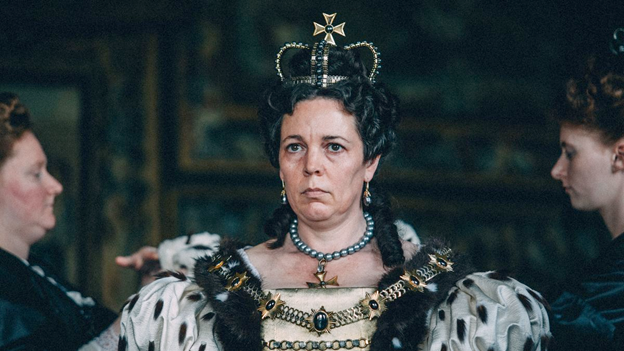
84. THE FAVOURITE / Yorgos Lanthimos / 2018
Genre: Comedy
Remember the Kalisi meme? From the last season of GAME OF THRONES? The one with her squinting, harnessing the power of a thousand annoyed white women through that balled-up, sour lemon stare as if to say “Oh, that’s cute.” That meme postdates THE FAVOURITE, which is a shame, because had the internet had quicker access to Yorgos Lanthimos’ black comedy, I don’t doubt it would’ve become a similarly dominant meme through the end of the decade. An iteration of that face happens roughly one hundred times throughout, each of the film’s lead actresses (Rachel Weisz, Emma Stone, and Oliva Coleman) masters at communicating broad strokes through petty microaggressions and disgusted nose turns. The entire film becomes variations of a theme, a Kardashians-esque farce that both loathes and relishes in the characters’ insanity and, in turn, us for loving it. Among the funniest films released in the 2010s, with unexpectedly some of the strongest physical comedy put to screen (Nicholas Holt pushing Stone down the hill and Weisz throwing the book at Stone are both perfectly played), the sniping and teeth-gnashing are effortless and land big laughs. [CJ Simonson]
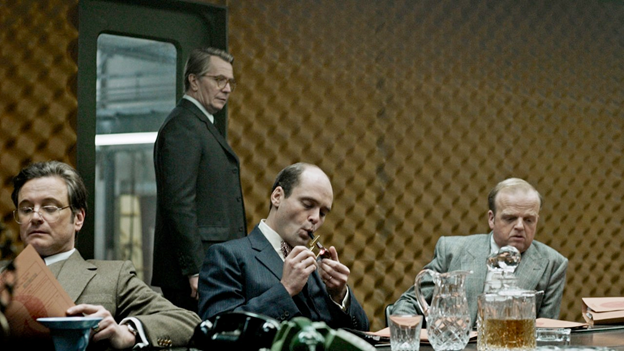
83. TINKER TAILOR SOLDIER SPY / Tomas Alfredson / 2011
Genre: Thriller
In what is quite possibly Gary Oldman’s defining role (don’t even utter the words “THE DARKEST HOUR”), Tomas Alfredson’s espionage drama has certainly cemented itself as one of the most aesthetically and narratively refreshing spins on an age-old genre, one mired in a tradition of loudmouthed, patriotic spectacle for far too long. Here, Alfredson crafted the antidote to the harmful, misogynist James Bond-types with TINKER TAILOR SOLDIER SPY, which is more interested in the psychoanalytic implications of professional espionage than it is with a bad guy’s nefarious plot. Spyhood is reified repression, whereby the act of deception has turned into an identity. There is no truth to be found in any of these men—besides their sexual proclivities, which are themselves tainted and infected with the spies’ imminent deceit. Cinematography by Hoyte Van Hoytema is exquisitely textured, 1970s acid jazz deluge, and the performances are impeccable. [Luka Stojcic]
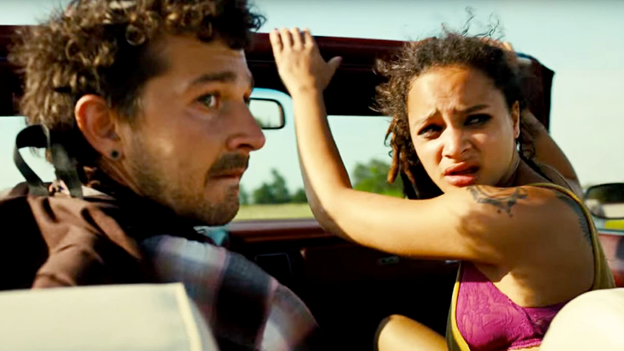
82. AMERICAN HONEY / Andrea Arnold / 2016
Genre: Drama
Sentiments towards capitalism, especially the dire straits of America’s current socio-economic climate, were a dime a dozen in the 2010s. And as many films of this ilk proved, they often suffered from calculation, directors using their platform to make an urgent political statement, but leaving their characters and their stories in the dust. British director Andrea Arnold has proven her creative chops in her short film WASP and the 2009 drama, FISH TANK. She knows cinematic structure like the back of her hand. But what she created in 2016 may just be the crowning achievement for American-set social realist cinema. AMERICAN HONEY is a towering achievement, among the most genuine films of the 21st century, and the greatest film Harmony Korine never directed. It loves its characters and lives inside of their impoverished decadence, really, truly, getting to know who they are. Arnold commits so much more time to her subjects than to holding that political megaphone that the film’s thesis statements are born holistically. [Sergio Zaciu]
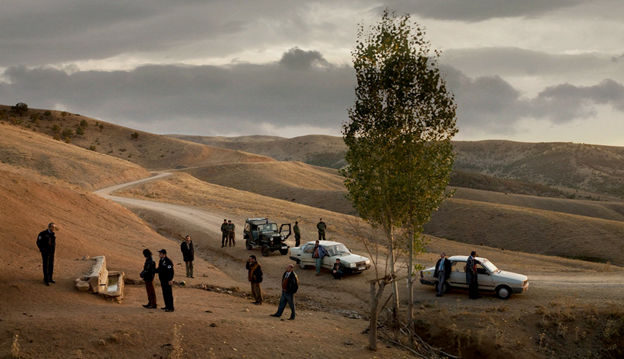
81. ONCE UPON A TIME IN ANATOLIA / Nuri Bilge Ceylan / 2011
Genre: Drama
Living up to its namesake, ONCE UPON A TIME IN ANATOLIA gives its audience such a precise, nuanced view of an otherworldly milieu that it actually begins to read like a fairytale, a world and lifestyle so alien in its monotonies that it can’t possibly take place on earth. Turkish auteur Nuri Bilge Ceylan renders the fields of Anatolian steppes into a modern wild west, vast as far as the eye can see, but littered with tidbits of folklore (the apple scene is one of the most poetically indelible moments of the entire decade). It’s a stylization that hearkens back to Kiarostami’s work in THE WIND WILL CARRY US, using its rural Middle Eastern setting to create levels of discomfort for its metropolitan leads. It is at both times intimidatingly alien and alluringly primal in its magnetism. It is a film that just lives and breathes poetry. Nothing feels insisted upon by an authorial presence. The way Ceylan manages to find tragedy in the plodding, languorous experiences of every single character in this film is outstanding. It is a complete deconstruction of what we expect from a police procedural, and would be a fascinating double-feature bill with POLICE, ADJECTIVE. [Sergio Zaciu]
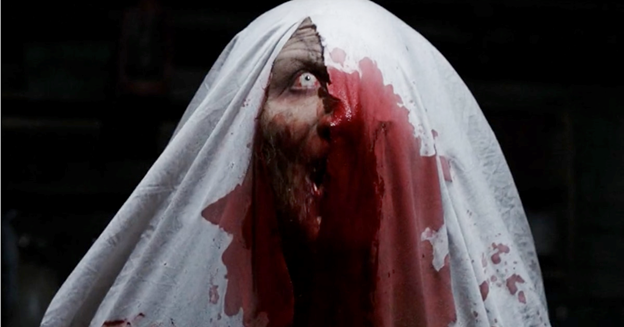
80. THE CONJURING / James Wan / 2013
Genre: Horror
Essays can (and have) been written about the 2010s legacy of reshaping the horror genre—thanks in large part to the accomplishments of A24 (love ‘em or hate ‘em). And while the Ari Asters and Robert Eggers of the world surely deserve some praise here, James Wan ought to be applauded for finding ways of keeping the primal magic of traditional horror alive; you know, the type of horror whose sole mission was to get an entire theatre to jolt in their seats whenever the characters went to sleep? Perhaps no film displays this better than THE CONJURING, the perfect throwback to old school horror. James Wan expertly builds an atmosphere of terror that only grows as the Warrens face off against demonic threats. What makes THE CONJURING so endearing is the strong craftsmanship on display, delivering clever tricks and subversive takes of typical horror jump scares and frights. The film takes great care to make you like these characters before throwing them into situations of pure terror. Its focus on character and story have made THE CONJURING the cream of the crop when it comes to the Conjuring franchise. [Daniel Brian Foster]
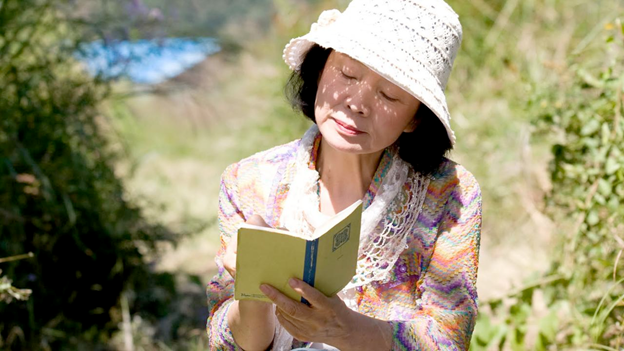
79. POETRY / Lee Chang-dong / 2010
Genre: Drama
Name one other film about a grandmother dealing with her own dementia, her grandson’s abhorrent sex crimes, and her adorable interest in writing poems? Lee Chang-dong, unlike any other auteur, commands structure like he’s hand-stitching a Turkish carpet. His story unravels in such gradual, deliberate, serpentine fashion that it’s impossible to identify what direction he’s pulling his narrative; a blissful mandala of the everyday colliding with heavy—and I mean heavy—drama. It almost reads as free-written, a tale that perpetually follows the most logical next step for the character, agreeing that the end-result will be as long as the story needs it to be. Instead of aiming at some larger, long-con end goal, Lee’s attention is firmly placed on the behavior and mannerisms of his protagonist in the now, and by giving her a set of charming, easily identifiable repeating locations, the film elliptically cycles through the lead’s daily routine. It is, quite possibly, the most present film I’ve ever seen. [Sergio Zaciu]
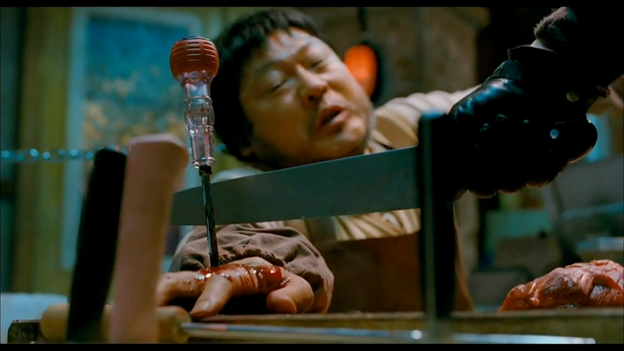
78. I SAW THE DEVIL / Kim Jee-woon / 2010
Genre: Thriller
Korean thrillers have had quite the renaissance since the dawn of the 21st century. What first began with a global stanning of Park Chan-wook’s OLDBOY quickly helped establish the likes of Bong Joon-ho and company in the public eye. Korea went mainstream, not just with K-Pop, but with K-Cinema, a national cinema that riffed on the delicate balance of high-octane action and Greek tragedy. I SAW THE DEVIL is a masterstroke of suspense and thrills, delivered by Korean genre-hopper Kim Jee-Woon, building an atmosphere of terror that makes the viewer question who is truly safe in such a cruel world. Every scene is expertly shot and paced, allowing the viewer to be sucked into this world and its characters. And what I SAW THE DEVIL lacks in subtlety, it more than makes up for with gut-wrenching scenes of pure adrenaline intensity that will leave your jaw on the floor. The final moments alone put this film in a whole new perspective, offering a morbid outlook on society and how our actions affect it. [Daniel Brian Foster]
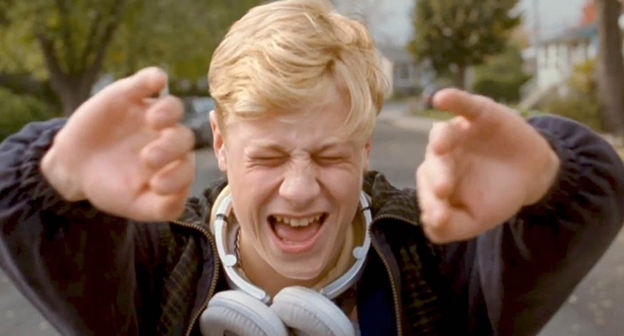
77. MOMMY / Xavier Dolan / 2014
Genre: Drama
Boxed in by the claustrophobia of a 1:1 aspect ratio (distinctively that of an Instagram photo), the wunderkind heir apparent of Canadian cinema, Xavier Dolan, delivers his most refined take on his favorite subject: the troubled yet tragically loving relationship between a mother and a son. An ode to adolescence in suburbia—perhaps best encapsulated by a subtly heartbreaking skateboarding montage set to Counting Crows’ “Colorblind.” And indeed: that soundtrack, a dead-on collection of ‘90s/2000s hits, accents the film like a gourmet masala spice mix. How can you hate a film that has the cojones to unironically feature Eiffel 65’s “(Blue) Da Ba Dee”? You can’t. And seriously, was there a more exhilarating moment in cinema this decade than when in a moment of orgasmic joy, set to the immortal “Wonderwall” by Oasis, Antoine-Olivier Pilon literally pushes the black bars of the screen to open us up to a traditionally wider 1.85:1 aspect ratio? There wasn’t. I wasn’t even at Cannes for the ovation that followed the moment, and yet I could still hear its echo as I watched it. Featuring absolutely terrific, life-affirming yet heartbreaking performances by the always phenomenal Anne Dorval and Suzanne Clement, MOMMY is a marvel. [Reid Antin]
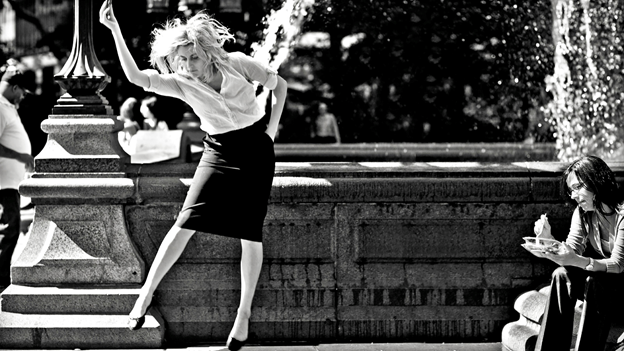
76. FRANCES HA / Noah Baumbach / 2012
Genre: Comedy
The story of love must be told many times. The story of love is at the core of Noah Baumbach’s 2012 film FRANCES HA. It’s a tale every young woman experiences, yet one rarely committed to film: Sophie is ready to grow up, Frances is not. It’s like a bad breakup but worse, the steady downgrade from best friend to brunch friend to “a friend from college.” Greta Gerwig and Noah Baumbach’s script is unforgiving, as Frances’ jokes go unappreciated, her presence becomes less and less welcome, and the absence of Sophie is omnipresent. Shot in black and white and riddled with invocations of the French New Wave, on the surface FRANCES HA appears a tad pretentious, but Frances’ struggle is too earnest to write off as white nonsense. Gerwig’s performance is so grounded and sincere it is almost painful to watch at times as she clings to a version of her life that no longer exists, pleading for a return to the familiar. That sense of familiarity never returns. But, in a scene that rivals the end of any rom-com, Frances finally finds her way back to Sophie, and the two share a moment so intimate you almost feel the need to look away. It’s friendship. It’s true love. [Aya Lehman]
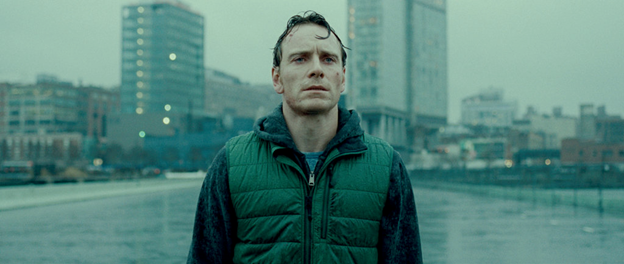
75. SHAME / Steve McQueen / 2011
Genre: Drama
As a movie-going public, the voyeurism of the medium is frequently lost on us. For as long as the camera has existed, critics have waxed poetic about its use as a peephole revealing a world of distant pleasures we happily engage from afar, the lives of others writ entertainment. Steve McQueen understands this complicated relationship and knows SHAME is a hard watch, preying on our desire to look through the peephole and display harsh realities as spectacle. It’s quiet and devastating, the culmination of a life of sex addiction spirialing slowly out of control. McQueen uses long takes to fully explore Brandon (Michael Fassbender) and his own helpless, predatory eyes. Its depictions of sex are unflattering, dangerous, and often scary, the voyeurism becoming nearly nauseating by the end of the film. His work has rightfully become more mainstream in recent years, but with SHAME McQueen perfects a singularly stark, raw energy that exists throughout all of his films, and in the process pushes Fassbender to the best performance of his career. [CJ Simonson]
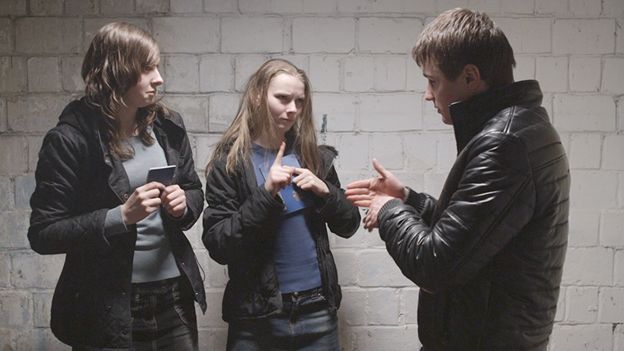
74. THE TRIBE / Myroslav Slaboshpytski / 2014
Genre: Drama
At its core, cinema is so effective simply because the act of watching human beings interacting on a projection screen in a dark room is universally compelling. Before the full development of sound, people were still mesmerized by seeing images of people move across a canvass. The raw alchemy of Slaboshpytskyi’s THE TRIBE lies in his ability to break cinema down back to its base elements and still conceive of a frighteningly effective picture. With no dialogue and no subtitles, THE TRIBE demands your close attention as you watch a gang of deaf Ukrainian school children destroy each other from the inside out. The alienation and hopelessness of the film is brutally difficult to bare, but the ability to connect with an isolated group of people that the viewer would otherwise never be able to understand is genuinely transportive, the very meaning of cinema. For all its flaws (the film is arguably masochistic in its violence and depiction of sexual assault), THE TRIBE is a film that wraps itself around your soul; a haunting, singular experience that refuses to leave you. [Carter Moon]
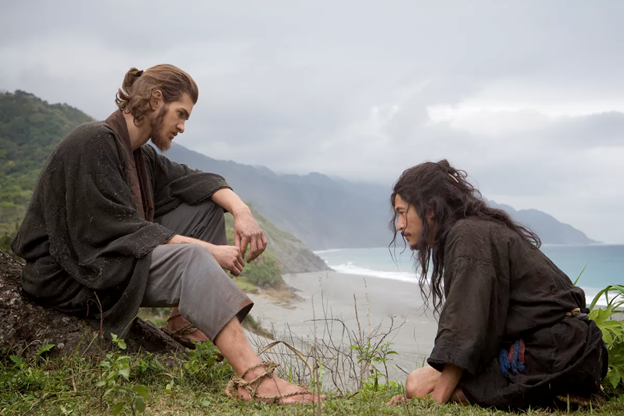
73. SILENCE / Martin Scorsese / 2016
Genre: Drama
In 1640, after the Shimabara Rebellion which resulted in the outlawing of Christianity, Portuguese Jesuits Garupe and Rodrigues (Adam Driver, Andrew Garfield) travel to Japan to find word of a lost Father. They are taken in by Japanese Kirishitans who live in muddy huts with scarcely a bowl to share amongst them. Persecuted by the Buddhist Shogunate, they live in secrecy for fear of torture, death, and—worse—korobu: to “fall down,” renounce. Christ spent a night in the Garden, but these people live in it. They suffer so greatly, and for what? Conviction? Vainglory? A desperation, that the next life will be better than this wretched tabernacle? As the priests are made to grapple with, Japan is a “swamp” where Christianity will not grow. “Plant a sapling here and the roots rot.” But there is a flower which blooms in such places. In Buddhism, the lotus, which rises from the foulest waters, symbolizes a transcendent purity obtained in the surrender of one’s desires, conceits and misgivings—not unlike kenosis. Anguishing yet profoundly moving, as is so often the case with faith, SILENCE is an intensely personal offering from Scorsese, and among his finest achievements. [Joseph Simpson]
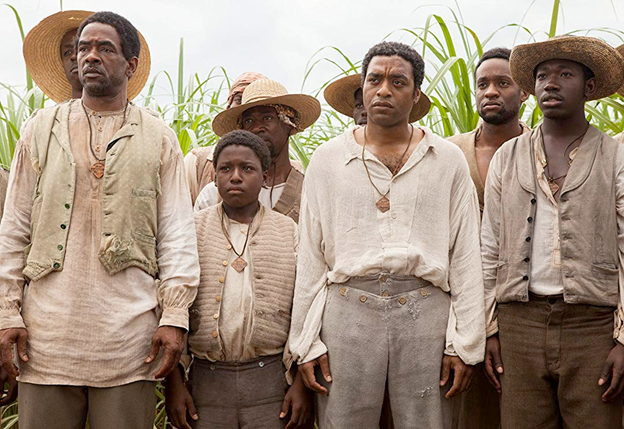
72. 12 YEARS A SLAVE / Steve McQueen / 2013
Genre: Drama
12 YEARS A SLAVE is far from an easy viewing experience, but it is an essential one. Every frame, performance, and music choice is meticulously crafted and placed to give the most authentic portrayal of the horrors of slavery. Steve McQueen does not hold back, letting the camera linger on lynchings, whippings, sexual assault, and the brutal acts of violence an entire race of people were subjected to. Chiwetel Ejiofor delivers his best performance to date, drawing us into the struggle of Solomon Northup’s fight to get back to his family. But it is Lupita Nyong’o who came out as the true breakout performance. 12 YEARS A SLAVE is a heartbreaking portrayal of one of the darkest times in American history. It imbues the lingering shadow that slavery has cast over the black community and is a fitting reminder of why we must not hide our history but learn from it. [Daniel Brian Foster]
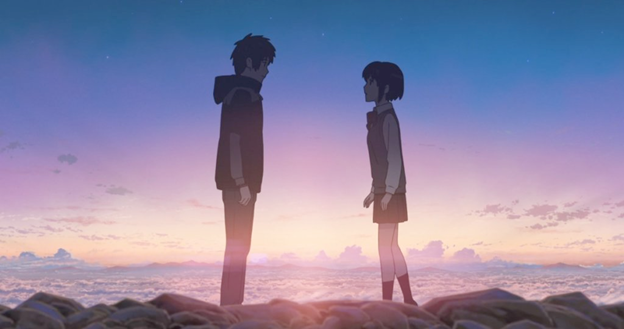
71. YOUR NAME / Makoto Shinkai / 2016
Genre: Romance
For the better part of the millennium, anime films have had a renaissance. Television had a heyday in the early ‘90s and 2000s, with titles like POKEMON and SAILOR MOON. But, apart from Miyazaki’s opuses, America’s been rather dark to Japanese feature animation. Well, finally that’s changing, and just in time to welcome another of Japan’s beloved directors, Makoto Shinkai, and his masterpiece YOUR NAME. Part FREAKY FRIDAY, part love story, Shinkai deftly weaves a story of magic, time, and tragedy, set against his famous, flickering sunset backdrops. YOUR NAME will make you cry. Make you think. Make you love and laugh and yearn for a world that never was. It pulls at your heart and lifts you up in a way that American films haven’t done in a very long time. It transcends and reveres culture. And every single frame of this film is absolutely gorgeous, a work of art no matter where you pause it. YOUR NAME will make you believe in love again. [Tracy Nicoletti]
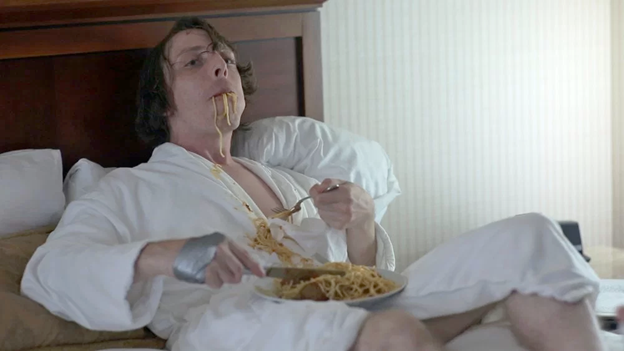
70. BUZZARD / Joel Potrykus / 2014
Genre: Comedy
This was a decade of blatant crimes and schemes, of nobody getting what they deserve and the little guy getting brutalized in the process. No one captured the petty, impotent rage of this decade quite like Joel Potrykus managed to with BUZZARD. Marty Jackitansky might be one of the most incompetent criminals ever committed to the silver screen, but damn if his pathetic little revenge against the system doesn’t feel so, so good. Joshua Burge gives the performance of a lifetime and proves himself to be a modern day Buster Keaton; we can only hope for a long career of him making us laugh with that weird face of his. As we flailed around and struggled to render anything meaningful out of these wretched years of struggle, Potrykus reminded us how important it is to laugh at everything, to give the finger to the notion of taking anything seriously, and to steal anything that isn’t bolted down. [Carter Moon]
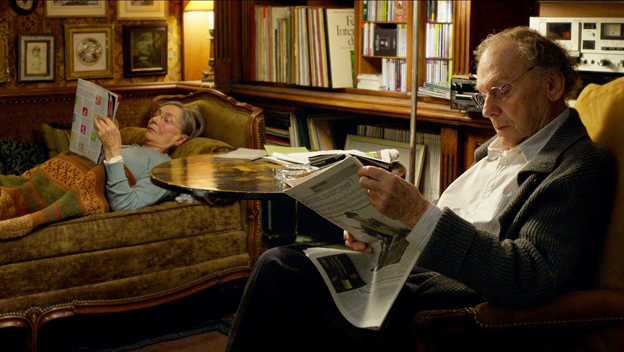
69. AMOUR / Michael Haneke / 2012
Genre: Romance
Haneke’s tales are not for the faint of heart and AMOUR is no exception. AMOUR is not the director’s most difficult film (that is FUNNY GAMES) but it is the most wrenching—in some ways still a bit of a shocker that a director like Haneke ever found his way onto the Oscar stage. The couple of octogenarians are not perfect people but they are warm and sympathetic, perhaps exclusively by virtue of being old. Haneke’s revelation is treating the violence inflicted upon the elderly subject with the same degree of apparent coldness as he does a younger subject. Haneke’s style is actually not cold; more than anything it is ambivalent, and one can always feel Haneke trying to communicate something rather than the director just signaling indifference or an unwillingness to roll in the mud with his scenarios, which is what the term “cold” would imply. This, not the mediocre HAPPY END, was Haneke’s swan song, and as anyone who has seen AMOUR can testify, just about any filmmaker can make a sappy Alzheimer’s drama, but only Haneke can make one that has you wrestling with life’s unrelenting certainties. [Luka Stojcic]

68. THE BEACH BUM / Harmony Korine / 2019
Genre: Comedy
Matthew McConaughey limped into the beginning of this decade with his last film having been perhaps the greatest summary of his much-maligned 2000s run: THE GHOST OF GIRLFRIENDS PAST. So yeah, it was time for a change, and it led to one of the greatest acting runs we’ve ever seen. Yet, while so many writers and directors tried capturing the actor’s brooding darkness, Harmony Korine went for the Id of 25 years of McConaughey. The definition of a “good hang,” our relationship with the smokin’ and jokin’ McConaughey is built around images of him being arrested, naked while playing the bongos, or his public relationship with equally laid-back celebrities. How many actors this decade could don a sailor’s cap, joint in hand, and deliver a line as poetic yet crass as “This life gig’s a fucking rodeo, and I’m going to suck the nectar out of it and fuck it raw dog until the wheels come off” in earnest? All of this is in the DNA of Moondog because it’s in the DNA of whoever we know to be Matthew McConaguhey, and it makes THE BEACH BUM a beautiful sendoff to the decade that brought us the McConaissance. [CJ Simonson]
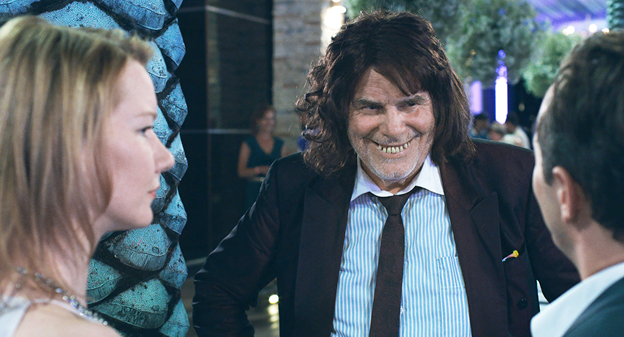
67. TONI ERDMANN / Maren Ade / 2016
Genre: Comedy
Three hours is long for a comedy, especially one set in the dry, cold world of international business consultants. However, to call TONI ERDMANN just a comedy is plain unfair, as it is a tale that reads as funny as it does thought-provoking. It can’t fit into one genre purely for how absurd it is. While on business in Bucharest, a German consultant gets an unexpected visit from her father, who inserts himself into her work life by becoming his eccentric alter ego “Toni Erdmann” in an attempt to reconnect with his daughter. Though slow, and at times cringe-inducing, for the right audience it hits in just the right place. In the big picture, it represents the disconnect between the flat, impersonal experience of the expatriate, while the complex relationship between the two leads draws us into the more intimate side of feeling disconnected from oneself. Not to mention—after watching you’ll likely never be able to listen to “Greatest Love Of All” by Whitney Houston without thinking about this film for the rest of your life. [Nadia Hayford]
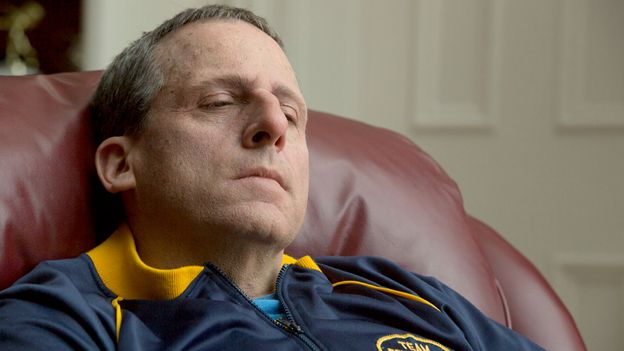
66. FOXCATCHER / Bennett Miller / 2014
Genre: Drama
Bennett Miller’s criminally underrated FOXCATCHER has the texture of a bruise, navigating psychopathy in stiff suits and Great Halls, with awesome self-hatred flowing through America’s self-proclaimed rulers seated for fully catered meals under the expanse of megaton chandeliers. The stagnant air of the Du Ponts’ colonial revivalist common rooms is more haunted than any demon in the Conjuring franchise. FOXCATCHER posits that America’s industry elites share the sickliest of goals: to become American heroes, all via the chilly, jealous gaze of company as commerce. Capital as loyalty and trading card trivia as manipulative leverage. When no one else sees your strength, it’s unspeakably easy for others to instill it. Mark Ruffalo’s Dave coaching his younger brother (played expertly by Channing Tatum) and rehabilitating him from the clutches of a predatory Du Pont reaches its zenith in FOXCATCHER’s stand-out sequence, a race to lose 12 pounds in 90 minutes—systems and cycles, repetitions in search of new results. Miller translates the very definition of insanity as some good ol’ fashioned roughhousing. [Kevin Cookman]
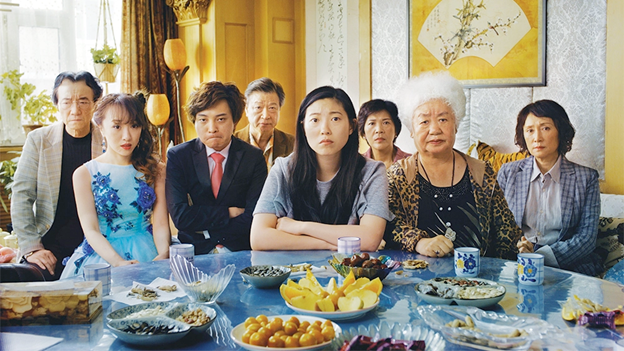
65. THE FAREWELL / Lulu Wang / 2019
Genre: Comedy
THE FAREWELL is a beautiful, moving piece for as many reasons as a debut indie feature by an NPR-approved storyteller can possibly be. An early Sundance darling, THE FAREWELL left every screening’s audience giggling through tears. It’s hard to explain the way this movie makes you feel—several friends told me they were avoiding it, fearing it would make them too sad. THE FAREWELL is sad, but so is life and death and family. But life and death and family are also joyous and funny and unfortunately you cannot have the happy without the sad; THE FAREWELL lives peacefully in the in-between. It’s easy to run away from the grief of death, but Billi (Awkwafina) realizes it is more painful to deny its existence and forgo what could be her final farewell to her beloved Nai Nai. THE FAREWELL’s greatest strength is in its depiction of the cultural confusion Billi experiences, having immigrated from China to America when she was a child and returning as an adult. To grieve death is inherently American. Here, we learn to celebrate. [Aya Lehman]
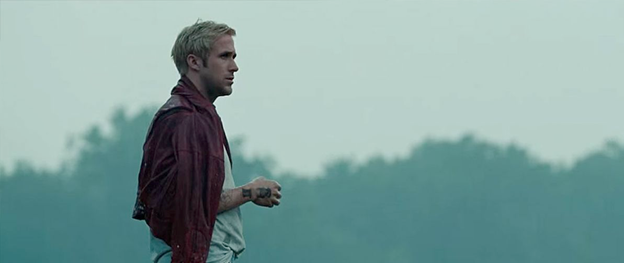
64. THE PLACE BEYOND THE PINES / Derek Cianfrance / 2012
Genre: Drama / Crime
Derek Cianfrance is in many ways the American auteur we left behind. But THE PLACE BEYOND THE PINES remains one of the strongest dramatic showcases of the decade. The bank robbery scenes are absolutely electric, and it doesn’t hurt that Cianfrance shoots the film in a rarely-utilized two-perforation 35mm system, which is naturally grainy and rugged. Cianfrance has definitely found a muse in Gosling. Both THE PLACE BEYOND THE PINES and BLUE VALENTINE utilize the La La Man’s good looks as a ticket into exploring the way James Dean rebels and chiseled leading man types transpose into the modern era. If we’re inherently sympathetic toward Luke—despite his antisocial behavior— because he epitomizes everything we venerate in a man, then how does our sympathy shift when we’re confronted with Bradley Cooper’s character—a similarly gorgeous man, who does similarly ugly things but whose class position is more secure? Whose side do we take when either one is just as primally erotic? The story of an act which ripples across generations, as two boys wrestle with their fathers’ legacies. How much can we truly know about who we are? [Luka Stojcic]
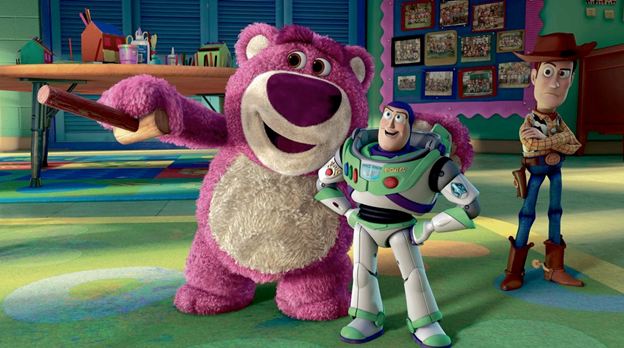
63. TOY STORY 3 / Lee Unkrich / 2010
Genre: Comedy
I sat in a dark theater in the summer of 2010, 18 years old and recently graduated from high school, prepared to watch Andy, 17 years old, pack up his room, leave his toys behind, and head off to college. A group of people between 16 and 24 flocked to the theater to see what was at that time set to be the culmination of one of the most formative and important animated film franchises of all time, and what a finale it was! The confluence of having grown up alongside such iconic characters that were simultaneously meeting their core audience at a pivotal moment in their lives, along with the fact that Pixar for the film’s 20-minute climax seemed as though they might do the improbable and kill off Woody, Buzz, and the gang, was unquestionably a lasting and powerful moment. And while I’d love to think that shared experience alone makes it worthy of highlighting on this list regardless of your age or the fact nine years later they made a middling sequel in spite of a perfect ending, the truth is that TOY STORY 3 is actually the best in the franchise, context be damned. In a series that’s nothing but escape plot lines, they perfect it in round three with THE GREAT ESCAPE hijinks and some of the most colorful new characters yet (Michael Keaton as Ken remains a pinnacle of voice acting performances). And revisiting the film now years removed from college and with the knowledge that our heroes survive the trash compactor doesn’t in any way diminish how powerful their brief acceptance of death is in the climax. It’s an emotionally charged film for a particular generation, but even devoid of that coming-of-age circumstance, it’s one of Pixar’s finest. [CJ Simonson]
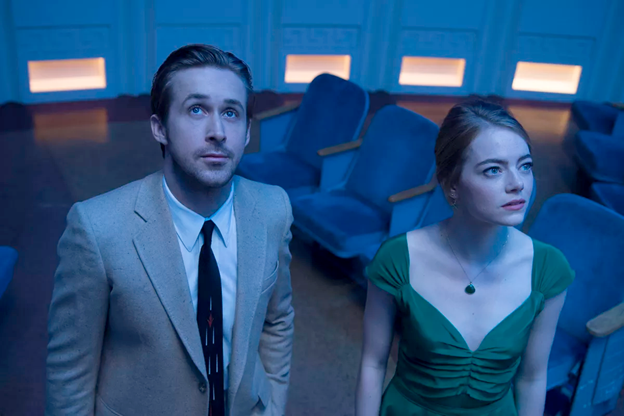
62. LA LA LAND / Damien Chazelle / 2016
Genre: Romance
December of 2016 was a weird time, and Damien Chazelle’s SINGING IN THE RAIN-style musical about two white people trying to make it big in Los Angeles was not everyone’s cup of tea. Yet, is there a better film to capture the naivete of pre-2016 America? LA LA LAND came barreling down the pipe with relentless optimism. Big sweeping musicals aren’t dead, here’s one nominated for Best Picture! LA traffic isn’t a death march, it’s a bombastic musical number! Emma Stone and Ryan Gosling can sing and dance! It believes in dreams and true love—and yet, it isn’t afraid to acknowledge that things don’t always go as planned. The bittersweet ending posits that you can still be happy even if you don’t get everything you ever wanted, and is there a better message to keep in your back pocket going into the new decade? I will never forget weeping openly at this film in theaters the year I graduated college and moved to Los Angeles to pursue my dream of writing. Now, I’m working in representation—not where I thought I’d be, but happy nonetheless. LA LA LAND is a special, hopeful film, and I don’t know if we’ll get anything like it again. [Kate Brogden]
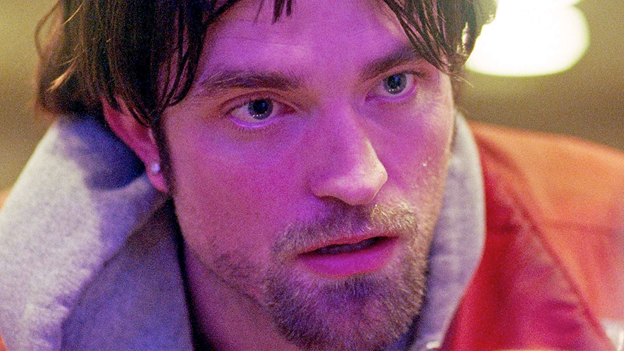
61. GOOD TIME / Josh and Benny Safdie / 2017
Genre: Thriller
From frame one of the New York skyline to its climactic close-up on Robert Pattinson’s weary and well-worn mug—should you choose to accept it, you are in for a roller coaster nightmare. One worthy of the sad, neon-lit amusement park the characters hide in midway through the film: Welcome to Queens. The Safdie Brothers use film grain as Seurat used pointillism, smearing their characters with a layer of grunge so thick you fear you may catch a disease from just watching it. The frenetic editing takes the best instincts of Paul Greengrass and creates a surprisingly coherent portrait of chaos. The music brings you into a horrifying sci-fi sonic landscape not heard since the VHS days of RUNAWAY TRAIN and PRINCE OF THE CITY. Anything can, no, will happen in this world of borough bail bondsman shops, low-end bank robberies, and smarmy apartment porches. The Safdies are unafraid to make indulgent choices—look no further than the structure of the opening title card coming 18 minutes into the film. But their sense of irony is unquestionably biting and sharp, perhaps best encapsulated by the image of an episode of LAW AND ORDER playing on a crappy jail TV. If this is their MEAN STREETS, I can’t wait to see their GOODFELLAS. [Reid Antin]
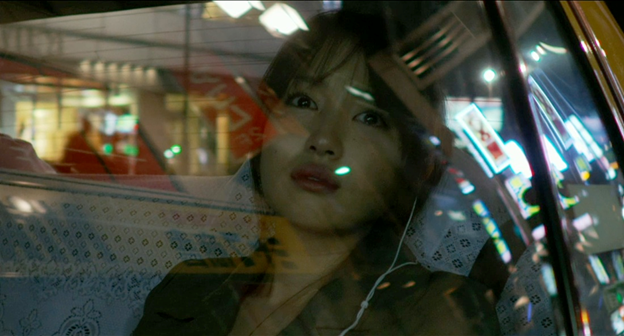
60. LIKE SOMEONE IN LOVE / Abbas Kiarostami / 2012
Genre: Drama
The late Abbas Kiarostami left us with masterpiece after masterpiece, defining so much of Iranian cinema and the art house at large, so it only made sense that a late-career outing would have him venture away from his homeland, making a film in one of the world’s most vivid cities: Tokyo. LIKE SOMEONE IN LOVE paints an oddly compelling and contemplatively melancholy character study, avoiding the basic rules taught in a screenwriting 101 course by playing out like a series of episodic encounters. It’s a Murakami novella, but written by an Iranian man, fusing his penchant for repeating geography with his fascination for placing opposing personalities in the same room. Kiarostami manages to capture Tokyo with incredible authenticity, intelligently avoiding the glamorous spectacle of Shibuya and Shinjuku. Instead, the Iranian director shows a side of the city that foreigners often forget: the calm, serene nature of the Japanese people. In the film’s opening act, Kiarostami places his protagonist in the nightlife of high-end Tokyo and allows her to travel away from this visual cliché. Through this brilliant technique, LIKE SOMEONE IN LOVE subtly directs its audience to the character study that Kiarostami desires to analyze in his second and third act. [Sergio Zaciu]
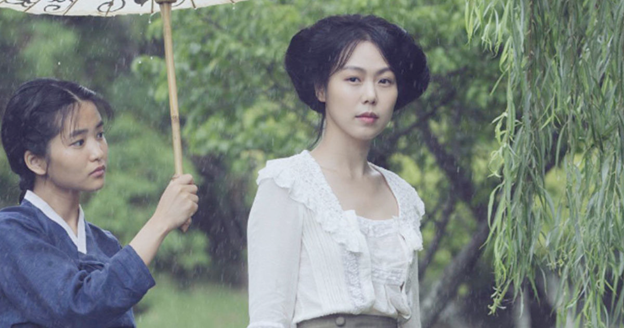
59. THE HANDMAIDEN / Park Chan-wook / 2016
Genre: Thriller
Known sicko Park Chan-wook’s work is definitely not for the squeamish, faint of heart, or perturbed by common social convention. The aforementioned notion doesn’t fall on deaf ears with Park’s 2016 decadent vision, THE HANDMAIDEN. Based off the 2002 novel Fingersmith by Sarah Waters, THE HANDMAIDEN is the ‘30s Korean version that tells the tale of dastardly demise, irrevocable love, and gruesome betrayal all steeped in RASHOMON pastiche. Audiences can only be gobsmacked by gorgeous costumes, breakneck pacing, and writing that will keep you guessing until the very last second. Although, despite these tenants, there is still a glaring problem with THE HANDMAIDEN. The problem rhymes with retishization of mesbian smex. My one qualm aside, THE HANDMAIDEN is Park Chan-wook, demented, fairytale, and with breathtaking visuals and a mystery that will make your skin crawl. We should only hope it’s not his last. [Jesse Herb]
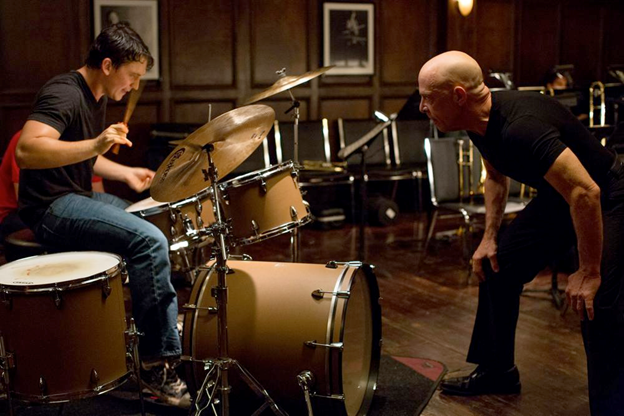
58. WHIPLASH / Damien Chazelle / 2014
Genre: Drama
Wow. Just thinking about WHIPLASH gets me stressed. Rarely has my heart ever raced as hard while watching something (2018’s GOOD TIME, another inclusion on this list, comes to mind). Perhaps the pinnacle of Miles Teller’s career before his doomed participation in THE FANTASTIC FOUR, he brings an incredibly focused energy to his role as a tortured jazz drummer at an elite music school. And J.K. Simmons forever changed his face from his iconic turn as Spider-Man’s J. Jonah Jameson to terrifying jazz teacher Fletcher. Or is it Mr. Fletcher? I can’t quite remember, but… just please don’t hurt me J.K. The writing, acting, editing, and camera movements all line up with the impeccable pacing and endless journey to perfection that the movie celebrates. It’s a wild ride, and has gone down in history as Damien Chazelle’s announcement to the world that he’s a force to be reckoned with. [Sam Wall]
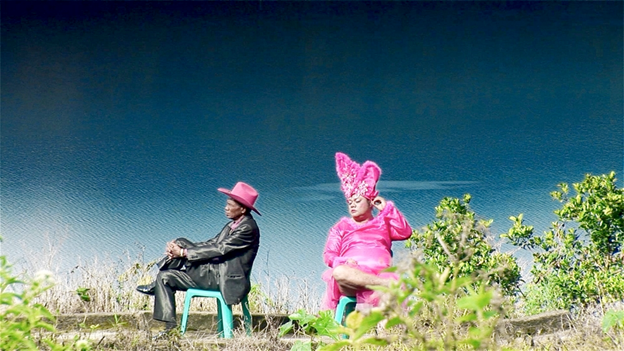
57. THE ACT OF KILLING / Joshua Oppenheimer / 2012
Genre: Documentary
I don’t believe in justice. That is to say, I don’t believe that after a person commits a heinous act, there is any way to punish them that meaningfully retributes the harm they caused. My thinking on violence and justice was transformed considerably by descending into the madness that is Joshua Oppenheimer’s THE ACT OF KILLING. Few works of art have ever been so foundational to a philosophical reexamination of core principles and beliefs as this film. Focusing on the perpetrators of the horrific mass murdering of communists in Indonesia, THE ACT OF KILLING presents a surrealist vision of villains who see themselves as heroes, largely because their government still recognizes them as such. Arranged by Joshua Oppenheimer and a crew of anonymous Indonesian filmmakers, THE ACT OF KILLING allows the men to reenact their crimes as if they are heroes in an action film. As the film unfolds, it demands that the viewer reassess their entire concepts of the meaning of history, of how narratives of the past inform our present. How do we achieve something approaching justice when an entire society cannot even admit to the existence of a crime? But the end result is clarity, a moral conviction to not allow horrors to occur, to confront the realities of the past in order to build a more just future. [Carter Moon]

56. SPRING BREAKERS / Harmony Korine / 2013
Genre: Comedy
There are few films that are just as surprising the second time as the first, but Harmony Korine’s baffling 21st century masterwork continues to remain as viscerally frustrating and confounding upon repeat viewing. But what I still admire most about SPRING BREAKERS is how intricately it’s designed to piss you off. Never content to give us what we want or expect, Korine maintains his expert grasp on contradictions throughout, nevermind his impossible-to-recreate blend of art house ambition and lowbrow intent—or perhaps it’s the other way around. There’s really not much about SPRING BREAKERS that makes sense, from the horndog cinematography juxtaposed with the overall message of female empowerment and agency, to just how immaculate the composition and aesthetic palate are when compared to the wilfully lazy story and characterizations on hand, to just how the Hell Korine got anything out of Gucci Mane at a pre-prison low, to why anyone affiliated with Selena Gomez and Vanessa Hudgens thought this was a solid investment. And yet, as Korine and few others are capable of pulling off, the steaming jalopy of nearly incoherent elements and influences manages to carry itself far across the finish line. [Thomas Seraydarian]
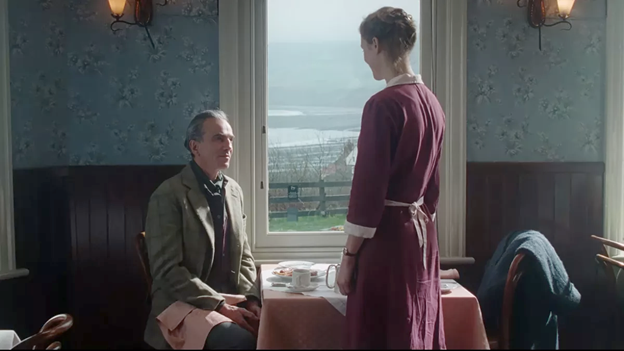
55. PHANTOM THREAD / Paul Thomas Anderson / 2017
Genre: Drama
A film akin to a silk sheet made of the highest (er, phantom) thread count! Reminiscent of Merchant-Ivory in its elegance, Paul Thomas Anderson marries the restraint of his previous two pictures with echoes of the opulence of his early work. As Reynolds Woodcock, Daniel Day-Lewis gives us a humanistic and intense performance with none of the accents or frills that adorn THERE WILL BE BLOOD and LINCOLN. Instead, he harkens back to the simpler times of THE UNBEARABLE LIGHTNESS OF BEING to give us a man (an arguably unlikeable man, at that) comprised solely of artistic arrogance and obsession. Over the course of 130 minutes, we ingest the film as a delectable pastry, one that we eventually digest, giving us a stomach ache during the middle section covering Reynolds’ illness, coming out as a light fart as it devolves into a sick romance predicated on food poisoning. In the end, the film produces a punchline worthy of “Frankly my dear, I don’t give a damn” in the wispily uttered, “Kiss me my dear, before I’m sick,” followed by Jonny Greenwood’s swooning orchestral score worthy of Waxman. Never has a man sitting on a toilet seat ever been so touching. [Reid Antin]
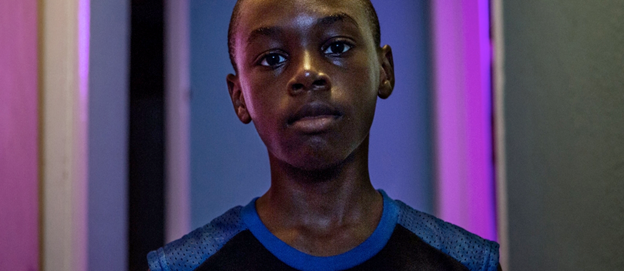
54. MOONLIGHT / Barry Jenkins / 2016
Genre: Drama
As Boris Gardner floats over the studio logos, revealed to be playing from Mahershala Ali’s immaculate Chevy Impala, we are immediately introduced to an exciting, emboldened, and reassuring presence in both character and in auteur. While MOONLIGHT is undoubtedly the tale of Chiron Harris, Chiron himself would likely tell you that his life began under the wing of Ali’s Juan. A sleepy viewer may miss the character’s offscreen death, a genius tactic by Jenkins to enforce his undying presence in Chiron’s life: people pass, but what they instill and how they function in your memory lasts only as long as you, for better or for worse. The 2010s saw filmmakers of color making up for lost time—finally handed the reigns in relative en masse, Jenkins was head of his class in crafting motion pictures conceived and executed by the creeds and histories they were about. In MOONLIGHT’s lovely specificity lies its copious successes in universality; highlighting a life considered by many deep in the cut but ultimately as American as apple pie. If film derives its entertainment from the act of watching, MOONLIGHT was a sobering argument, and one of the few that presented the medium as a tool of seeing and being seen. You are not the outlier. You are in the middle of the world. [Kevin Cookman]
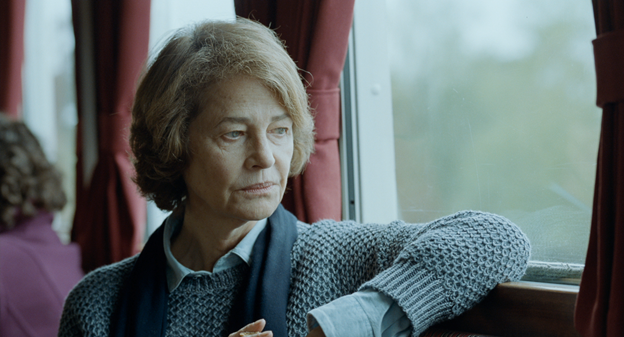
53. 45 YEARS / Andrew Haigh / 2015
Genre: Romance
Haigh crafted among the best television shows of the decade in HBO’s LOOKING after previously making WEEKEND, a film that unfortunately did not make it onto this list (but trust me, it is more than worth seeking out). His follow-up feature film, 45 YEARS, is a quiet, confident work, that—not unlike Haneke’s AMOUR—delves into the marriage of an aging couple as Geoff discloses his brief, treasured relationship with a woman named Katya who perished in a climbing accident decades prior to meeting his compassionate wife, Kate. Haigh is deliberate in his framing, paring down traditional coverage into fluid masters, which allows the relationship between Geoff and Kate to reach a level of tangibility and lived-in-ness, and since his film is studying the lives of two people who really have nothing to live for but each other, it’s absolutely gutting to see the emotional toll this trivial bit of information begins to take on Kate. Notable for maybe the most gutting sex scene of anything you’ve ever seen and closing out on a tear-jerking “Happy Together” needle drop, 45 YEARS just kinda gets old people in a way that’s often confounding considering the relative young age of its director. [Luka Stojcic]
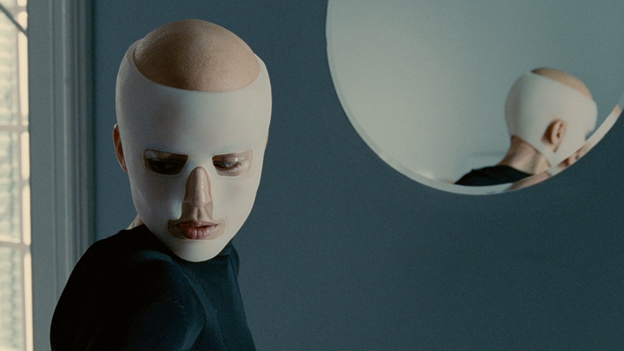
52. THE SKIN I LIVE IN / Pedro Almodovar / 2011
Genre: Horror
Almodovar’s assertions that THE SKIN I LIVE IN is a “horror story without screams or frights” ring absolutely true: this is, without a doubt, one of the most uncomfortable and existentially unsettling outings of the decade. To mention any of its plot would rob the uninitiated of what remains an absolute motherfucker of a midway mark: for as languid as some of the simmering tensions in the first hour can be, a sea change occurs that will leave all but the most cynical with their mouths on the floor. In the hands of practically anyone else, there would be more than enough potential to have a disaster on hand considering just how many lines this toes, but Almodovar’s pristine attention to detail as far as technical and aesthetic prowess is concerned, in addition to his confident grasp on an entire Shakespearean grab-bag of melodramatic themes and topics ensure that there is a mire of ethically and morally questionable characters and characterizations to wade through, but it’s certainly a journey you’ll be engaged in sticking with to the bitter end. That sinking pit in your stomach, that lightning-strike “Now wait just a minute…,” that shell-shocked feeling of having to scramble to process what you’ve seen… that’s an evocative filmgoing experience. And boy, does THE SKIN I LIVE IN deliver in that regard. [Thomas Seraydarian]
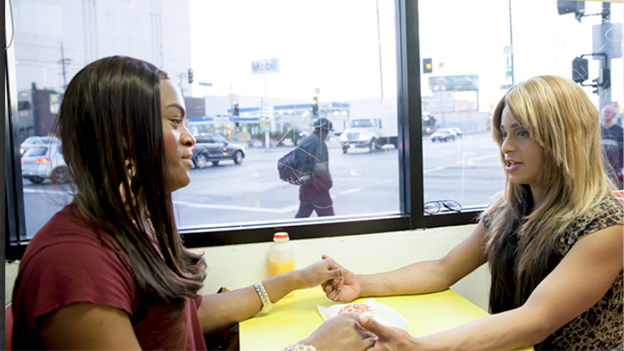
51. TANGERINE / Sean Baker / 2015
Genre: Drama
In a time where the cis world is intrigued about trans lives and transness as a whole, there is much to be said about art that tries to facilitate that hunger for knowledge. Sean Baker takes a step in the right direction by not only hiring actresses that are actually trans, but by not centering their narrative on trauma. It would have been exhaustingly obvious, and tone deaf, to make a dark comedy Baker deemed subersive by way of the “tragic absurdity” that trans WOC who do sex work have to go through, but he thankfully didn’t make that movie. Rather, Sin-Dee and Alexandra are two hysterical friends who spend the majority of TANGERINE exuding charm the best way possible: traipsing the streets of LA and speaking over one another. The plight of transness permeates only where it needs to, ie in every single step Sin-Dee takes to end up right back where she started, or Alexandra physically paying to do the only thing she really loves. While the slurs and constant reference to genitals feel like fuel for cis shock value, the humor of this film is undeniable and no one loves LA like Baker. With the saturation of yellows in day and blues at night, it’s all the magical realism Damien Chazelle wished for LA LA LAND. TANGERINE is a feast for the eyes, heart, and anyone who’s addicted to the undying survival of female friendship. [Jesse Herb]
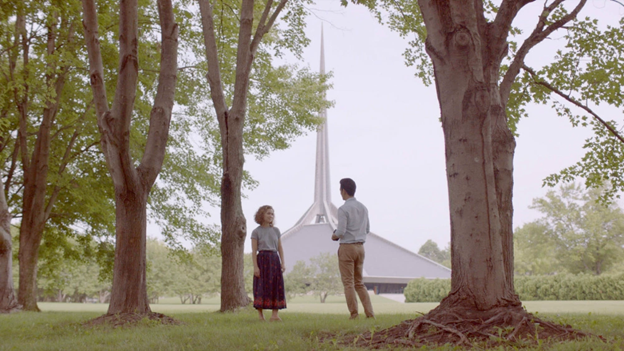
50. COLUMBUS / Koganada / 2017
Genre: Drama
It would be easy, if not dull, to dismiss the aesthetic perfection of COLUMBUS as a symptom of its location and not as a credit to its filmmaker. After all, the secluded Indiana mecca would look stunning on a Game Boy Camera. As far as framing devices go, however, few cinematic locations say so much as COLUMBUS. Like the buildings he deifies, Kogonada demonstrates meticulous intentionality in all aspects of his directorial debut’s design. The town’s one-of-a-kind architecture feels as out-of-place as our two adrift protagonists, stranded there by commitments but desperately wanting to be anywhere else. While COLUMBUS kicked off something of a Renaissance for John Cho, the face of simmering angst here, this is Haley Lu Richardson’s show. Richardson is a modern day Rapunzel, yearning for something in life other than the same flawless lines, curves, and edges that she studies every day. Her passion can barely be contained beneath a stoic demeanor that is cut from the same harsh contours as the town she has lived her whole life in. Watching the facade crumble is enough to melt the coldest heart, and Kogonada cannot get enough credit for going further than most auteurs to sculpt characters that are worthy of living in his breathtaking portrait. [Ed Dutcher]
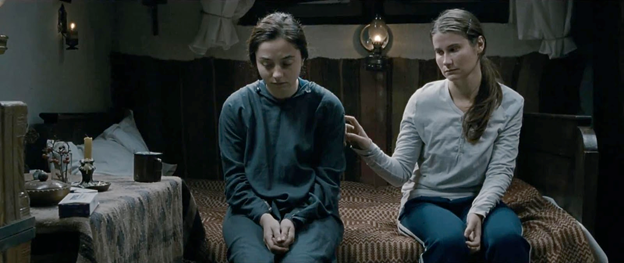
49. BEYOND THE HILLS / Cristian Mungiu / 2012
Genre: Drama
Few directors can stake claim to defining, and bringing, the identity of a national cinema to the general public. It means that their work is so indelible that it not only leads to worldwide acclaim and adoration, but helps shape the work of their peers within their home country. Romanian New Wave auteur Cristian Mungiu’s directorial output really speaks for itself. With his Palme D’or win for 4 MONTHS, 3 WEEKS, 2 DAYS in the aughts, Mungiu put Romania on the map in a way that his contemporaries Cristi Puiu, Radu Jude, and Corneliu Porumboiu hadn’t quite accomplished yet—all their films registering as just a little too art house, and too alienating to appeal to the general public. With his follow-up release, BEYOND THE HILLS, Mungiu continued to hone his craft, making perhaps his most inside-baseball film to date: an eerie proclamation against Romanian bureaucracy and the cultural entanglement with the Orthodox church. It’s a hard watch. A really hard watch. And though it’s not as immediately captivating as 4 MONTHS, the film’s shared Cannes win for best actress(es) and his ensuing Best Director win for his 2016 outing, GRADUATION, have cemented Mungiu as Romania’s most iconic living filmmaker. [Sergio Zaciu]
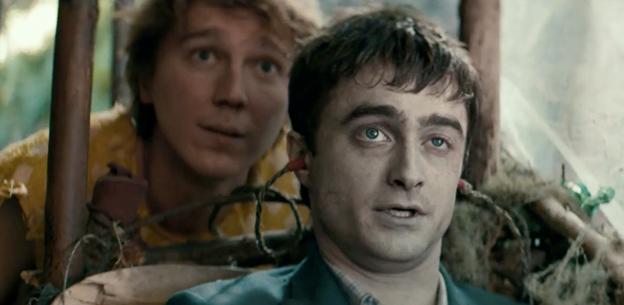
48. SWISS ARMY MAN / Daniel Kwan and Daniel Scheinert / 2016
Genre: Comedy
The memory of elation I felt after seeing SWISS ARMY MAN for the first time is something that I’ll carry with me to my deathbed. Released at the perfect time, when internet and pop culture consisted of Adult Swim-reminiscent concept and execution at a nadir of continually regurgitating semi-ironic “post-” take after “post-” take, the friends known as Daniels reminded us that it’s OK to experience a sense of awe. Say what you will about SWISS ARMY MAN, but it’s certainly not a film that has anything other than an incredulous grin on its face, often using the most base and knuckle-dragging framing device to make its emotionally explosive themes all the more viable. With a pedigree featuring some of the decade’s most striking images and a gleefully manic refusal to play by the rules, SWISS ARMY MAN was one of the first films I saw roll out an intense polarization live. But what I don’t understand about those who put the film down for its unabashed and clearly intentional vulgarity is the immunity to the message of love, hope, and self-acceptance that the film distinctly advocates. In a decade that seemed to perpetually reach new lows, SWISS ARMY MAN was a revitalizing bit of fresh air. There are few films I’d definitively state I’d show to any potential children, but SWISS ARMY MAN is undoubtedly one of them. [Thomas Seraydarian]
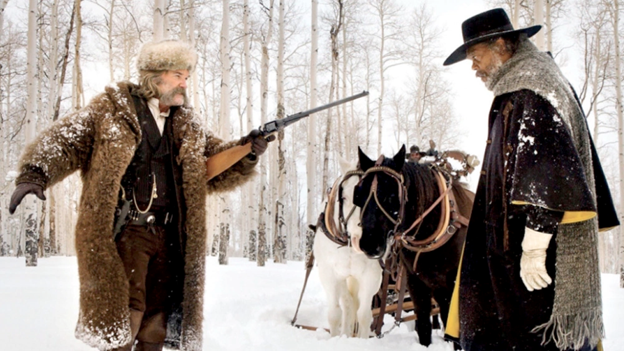
47. THE HATEFUL EIGHT / Quentin Tarantino / 2015
Genre: Western
Pending a rewatch of Quentin Tarantino’s entire filmography, I suspect I’d rank THE HATEFUL EIGHT on the lower end of his works. Having said that, few movie-going experiences are likely to ever measure up to when I saw the director’s eighth film on Christmas Day, 2015. The anticipation outside of the theater was practically electric, the air buzzing as strangers excitedly engaged with each other. That day, more than any other anecdote I can muster, best sums up why Tarantino is at the top of his craft. The man makes movies that are technically impeccable and deliberately paced, yet accessible enough that anyone can appreciate them. Look no further than the average Joes who spent their holiday standing outside the Regal Edwards Cinema 26 in Long Beach; this was likely one of maybe a dozen films most of them saw that year, but they enthused about kino with all the confidence of the grand jury at Cannes. There are plenty of Tarantino movies I like more than THE HATEFUL EIGHT, and a few I fancy even less, but any of them can go toe-to-toe with the best pictures of their respective years. [Ed Dutcher]
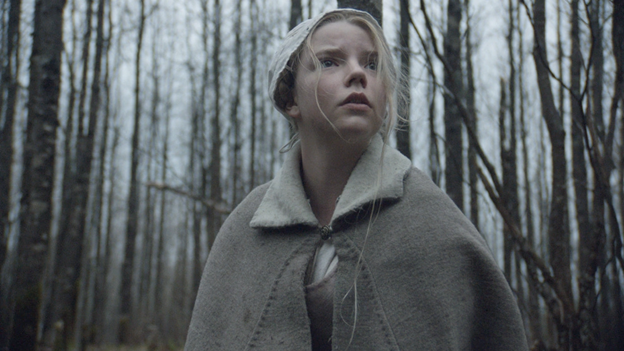
46. THE WITCH / Robert Eggers / 2015
Genre: Horror
There are few things as compelling in horror as isolation—“In space, no one can hear you scream” will perhaps forever be horror’s greatest tagline. As deeply social animals, few things activate our primal terror quite like finding ourselves truly alone. Even though the family in THE WITCH (the VVITCH?) are technically together, it does not take long to realize they are each alienated from the rest of the family. While Robert Eggers’ debut eventually delves into the magical, a solid three-quarters of the film is strictly psychological drama at the edge of the world. The balance between incredibly tense, claustrophobic drama and sharp bursts of reality-bending terror made THE WITCH feel like a sister-film to Carpenter’s masterpiece THE THING, a comparison that is not made lightly. With such rich performances, elaborate costumes, and impeccably researched dialogue, Eggers erupted onto the scene with an indelible mark that truly felt transportive to another plane of existence. In this decade of “elevated horror,” few directors demonstrated a dedication to precise craft and taking the genre seriously quite like Eggers. [Carter Moon]
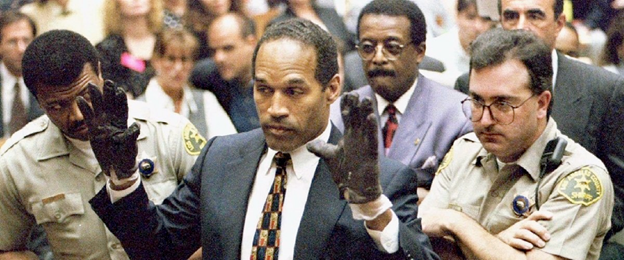
45. O.J.: MADE IN AMERICA / Ezra Edelman / 2016
Genre: Documentary
Is O.J.: MADE IN AMERICA even really a film? I don’t know. It won an Oscar, though, so we’ll run with that angle. You see, the best kinds of films are the ones that peel back the layers slowly, pulling you deeper and deeper until you lose track of time. Though this is not a feeling one would think to associate with an eight-hour (!!!) long ESPN documentary, this particular five-part series is a wild ride that will leave you thinking about it for weeks after viewing. OJ: MADE IN AMERICA is quintessential viewing for understanding the terrifying and labyrinthine issue of race in the United States, especially for those who may not have been old enough to remember the monumental O.J. Simpson case. The story is one that intersects racial stereotypes, the justice system, the downsides to obtaining the American Dream, and the power of celebrity—elements of American culture that will always feel timely. We can only hope that films like this stick around for the long haul to ensure we never turn a blind eye to the darkest parts of our history. [Nadia Hayford]

44. SICARIO / Denis Villeneuve / 2015
Genre: Thriller
How does one classify SICARIO? Is it a war movie or a crime movie? Is it more concerned with the drug trade or terrorism? Do any of these distinctions matter when the measures we take against them become indistinguishable? SICARIO dives headfirst into the murky waters of trafficking across the US/Mexico border, rarely letting the audience come up for air during its white-knuckled exploration of the war on drugs. The movie is certainly pointed in its depiction of violence, but it is also wise enough not to moralize over conflicts so heavily colored by complicity on all sides. It would be irresponsible not to mention Emily Blunt’s lead performance, killing it as a naive FBI agent whose integrity leaves her completely out of her depth. Her perspective is what’s able to so powerfully frame SICARIO as the political commentary that it is. It speaks volumes that the pulpy DAY OF THE SOLDADO, a studio sequel completely lacking the nuance or scruples of Villenueve’s film, is just as absorbing by merit of del Toro’s intense aura alone. That, I think, cements the ghoulish role of Benicio Del Toro’s modern-hitman, Gillick, as one of the decade’s best. [Ed Dutcher]
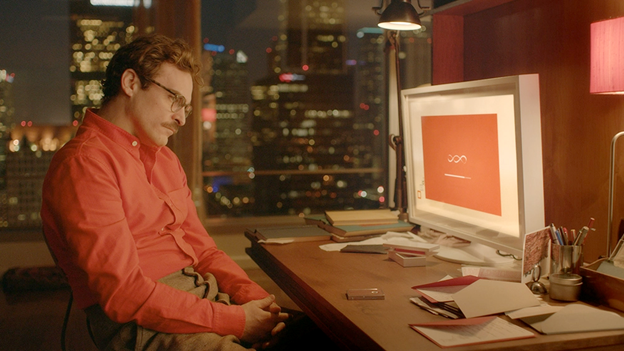
43. HER / Spike Jonze / 2013
Genre: Romance
HER is a film that deserves to be watched and re-watched. Something about Spike Jonze and team’s immaculate creation of a slightly advanced world perfectly blends relevancy and wonder together. None of the technology is so far advanced that one can dismiss it as fantasy, but the carefully colored and designed world of HER clearly exists in a reality different from our own. That being said, its main theme of connection cuts through to any reality, giving a gentle reminder that humans must continue factoring meaningful connections into our lives. Jonze has created one of the most original love stories on screen, and Joaquin Phoenix’s quiet conflict of isolation remains heartbreaking but results in such incredible highs and successes that it becomes impossible not to smile when he does. This is absolutely a must-watch of the decade and raises serious questions about where humanity may end up if technology continues to replace everything that defines us as “humans.” With HER, love and humanity are often put into question, so get off Tinder for three minutes, watch this movie, and have an existential crisis! [Sam Wall]
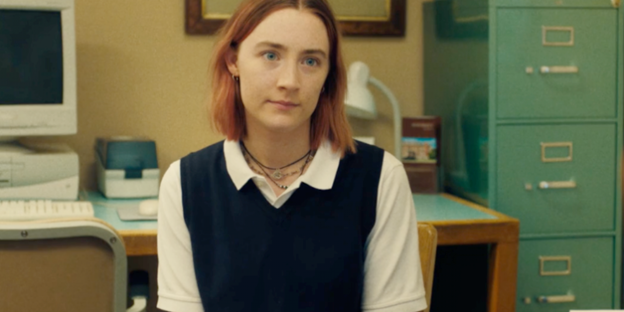
42. LADY BIRD / Greta Gerwig / 2017
Genre: Comedy
The relationship between a child and a parent is a complex and frequently dysfunctional one—certainly I can recall moments of incensed frustration and tension in my own household—and yet still from the outside in, I can’t begin to fathom the relationship between mothers and daughters. Even when Greta Gerwig’s directorial debut, LADY BIRD, is exploring teen angst and rebellion, or reckoning with middle-classism, or exploring the highs and lows of young love, it never strays from largely connecting those coming-of-age benchmarks to the relationship between mother and daughter. Each interaction between Lady Bird (Saoirse Ronan) and her mother (Laurie Metcalf) is every Thanksgiving dinner you’ve ever had rolled into one, a roller coaster of emotions that range from sweet, affectionate, awkward, angry, spiteful, and most importantly, complicated. Gerwig’s film understands better than most that in your youth, it’s easy to let young love and teenage rebellion and the follies of growing up overwhelm the fact that your parents are frequently your most encouraging teammates, and that all they want you to do is win. Watching Ronan’s Lady Bird come to understand that fact is a true joy. [CJ Simonson]
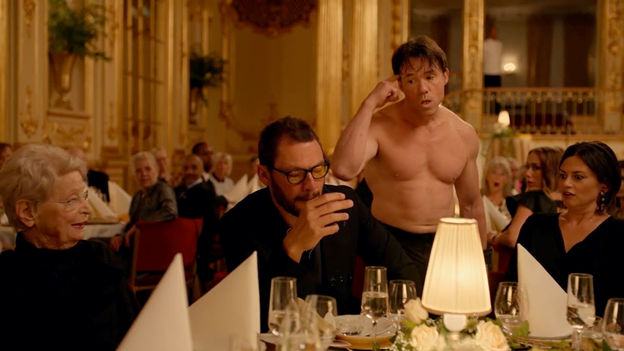
41. THE SQUARE / Ruben Östlund / 2017
Genre: Comedy
“The Square is a sanctuary of trust and caring. Within it we all share equal rights and obligations.” As is the theatre screen. Our right is to make ourselves comfortable, and our obligation is to remain quiet with respect for the filmmaker. Cinema is the church of the 21st century, an analogy that at this point has been said eloquently enough in CINEMA PARADISO and THE LONG DAY CLOSES. But Ruben Östlund has something else in mind. His concern does not lie with the public’s ceremonial migration to the movie theatre, but with the act of their spectatorship. As voyeurs, we must decide when something is art. If we do something completely absurd in real life, can’t that maybe be art too? It’s a distinction that only begins to take shape through the actualization of the film’s world. The more we believe in the square (read: the silver screen), the more layers of artifice we can project upon it. It’s a realization you begin to have when a boring art installation elicits no response from you or any of the film’s museum goers, but makes you roll on the floor laughing when a janitor has trouble navigating his waxer through the exact same space. And while THE SQUARE would be well and good as an academic commentary on modern art, Östlund still remembers to place character front and center, because let me tell you, I just wrote a bunch of really high-brow analysis, but this film whips so damn hard! [Sergio Zaciu]
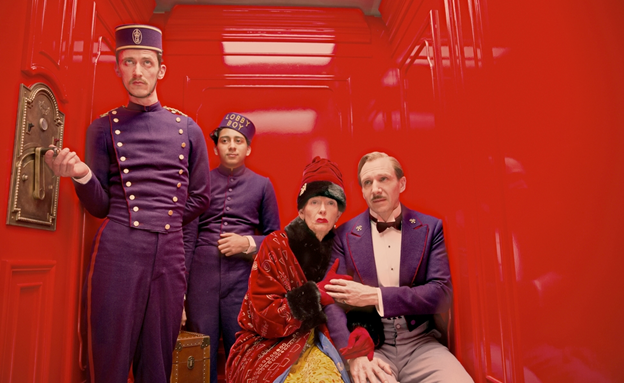
40. THE GRAND BUDAPEST HOTEL / Wes Anderson / 2014
Genre: Comedy
The king of magical realism hath come back on his throne for his most recent live-action film, THE GRAND BUDAPEST HOTEL. While the term “romp” feels antiquated and cheesy, it’s as on-the-nose as one can get for this whimsical love letter to the past. Filled with witty dialogue, saturated pastels, and a stop-motion tram scene that’s insurmountable, the film teems with wonderment. Although, it’s not just the idyllic aesthetic that cements GRAND BUDAPEST praise, it’s the way that said idyllic aesthetic seamlessly mixes with black comedy to create a juxtaposed masterpiece. Montages of geriatric sex, irreverent dialogue, and fumbling physicality galivant across the pink screen as smooth as butter on toast. Performances from actors in a different echelon at the top of their game, Ralph Fiennes most notably, somehow making a perverse, moronic concierge hot. THE GRAND BUDAPEST is a feast for your eyes, mind, and laughbox. Not to mention any film that showcases Saoirse with a face tattoo deserves a medal. [Jesse Herb]

39. THE QUEEN OF VERSAILLES / Lauren Greenfield / 2012
Genre: Documentary
Greenfield started shooting VERSAILLES in 2008, ostensibly following Jacqueline Siegel and her timeshare mogul husband David Siegel as the couple starts construction on their 90,000 square foot palace in the Everglades. In a fortuitous turn of events—for the moviegoer, that is—the Great Recession hits, and the remainder of the film tracks the deterioration of the Siegel family unit (the pair have seven kids). David Siegel is functionally a psychopath, treating his wife with contempt as he lusts after younger women, and his obsession for recouping his lost billions blinds him to the emotional distress of his children. Greenfield displays no sympathy for Siegel, with some of his interview segments preempted by a makeup person blotting his face, or cutting in such a way as to make him sound ridiculous. But the director has nothing but empathy for Jackie, an intelligent, compassionate woman trapped in a marriage with a malignant narcissist. In a poignant moment near the film’s close, Jackie says she will never leave David. “Not unless I died, that’s the only way I would leave him.” Siegel, at the time of filming, was 75 years old. Jackie was 44. [Luka Stojcic]
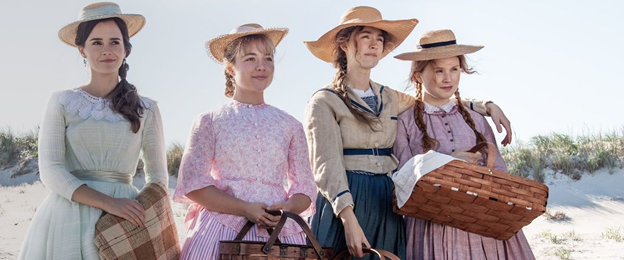
38. LITTLE WOMEN / Greta Gerwig / 2019
Genre: Drama
I can’t even imagine how Timothée Chalamet’s Laurie is able to fall asleep at night, knowing he is going to spend the next day and every other one after it surrounded by these lovely little ladies. The March Sisters are ageless constructs; when our great-great-great grandchildren are settling the rings of Saturn, Meg, Jo, Beth, and Amy will still be bringing joy into their lives, yet it’s hard to believe that any interpretation of Louisa May Alcott’s characters will be more beloved than this one. A delight to the senses, 2019’s LITTLE WOMEN drapes its soft colors and sunny dialogue over the viewer like a warm blanket on a rainy day. In what might be the most egregious Oscar snub this decade, Greta Gerwig once again proves her adroidt command of the screen by bringing unbridled vitality to a tale that’s been retold time and time again. Gerwig’s modern vision recontextualizes core themes, redeems characters, and somehow packs new surprises into a pillar of the modern, feminist, and American literary canons. Saoirse Ronan and Florence Pugh, along with an ever-bewildered Chalamet pinballing between them, lead an already stacked ensemble cast with firecracker charisma, acting to the rafters with jaw-dropping returns that will leave you breathless by the time the credits roll. [Ed Dutcher]
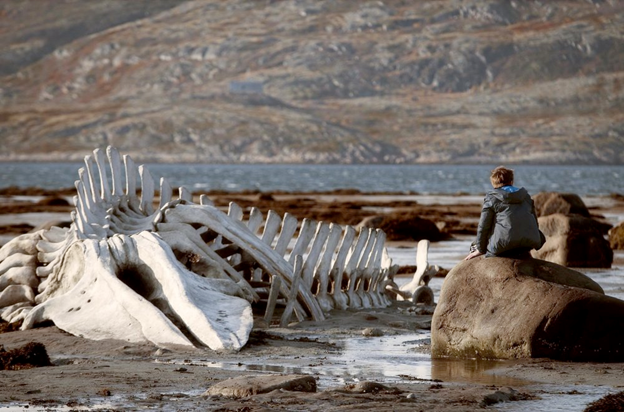
37. LEVIATHAN / Andrey Zvyagintsev / 2014
Genre: Drama
Devastation both political and personal all facilitated by the vodka-fueled Russian economic machine, Andrey Zvyagintsev’s opus entitled LEVIATHAN pitches itself as a modern retelling of the book of Job, yet supersedes biblical despondence with even more harrowing pain, one perpetuated by the modernity’s corruption. In a remote Russian fishing village, Kolya and his family are pressured to leave their home by a ruthless, mob boss-like mayor who wants to demolish it to construct a tourist-trap cultural center. Kolya enlists the legal help of his old friend-turned-lawyer Dmitriy but things turn out even more complicated than either of them could imagine. Hope runs dry just like the alcohol does as it becomes apparent that the mayor pulls every lever at his disposal to whittle Kolya down to a nub. It’s a lot to ask of an audience to be down for the entirety of this ride, but Zvyagintsev’s method in weaving an intriguing storyline, getting great performances out of his cast, and sleight-of-hand politics that never get messy or preachy make LEVIATHAN well worth it. More than the cookie-cutter poverty porn we typically see, LEVIATHAN is a story for the ages and one that will live on. [Alexander Ignacio Larios]
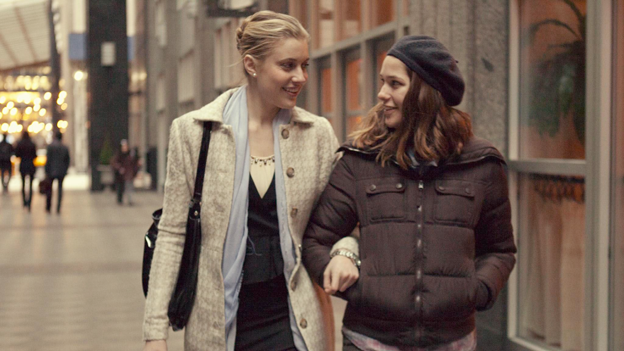
36. MISTRESS AMERICA / Noah Baumbach / 2015
Genre: Comedy
I’d be jaw-on-the-fucking-floor flabbergasted if Noah Baumbach and Greta Gerwig’s evenly sweet-and-sour resurrection of ‘30s-era Hawks is topped by another film that either of them, separately or together, ever make. Screwball in contention with the all-time greats, MISTRESS AMERICA is a film of immaculate technique and precise, lethal accuracy. Everyone speaks, but nobody listens. Greta Gerwig’s Brooke Cardinas is the prodigal daughter of holy phoniness, the exemplary that the boring look up to: a boring person who works doubly to hide it. How do you learn new skills? You try harder. Twitter has turned loose change into gold doubloons. The tiny percentile chance that your “funny” tweets get you into a writer’s room or a board meeting has become a drug for the chic entrepreneur, leading to a blur between the person and the persona. If the latter is ultimately what can pay the bills, then why bother tending to the former? It’s a crisis of authorship. Which stories do we have the right to tell and how do we know if we actually have the right to tell them? Of course, if we look at Tracy, 18 years old and rife with the discomfort of not being readily recognized as a genius, that question may just be moot if we identify that all storytelling is the result of false entitlement. Storytellers write what they steal and profit, fiscally and intellectually, from pseudonyms of folks more fascinating than they. That’s the art of discovering our ecstatic truth. [Kevin Cookman]
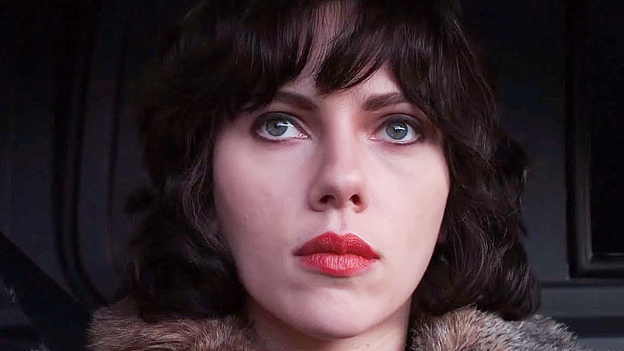
35. UNDER THE SKIN / Jonathan Glazer / 2013
Genre: Horror
Few films say as much about the human condition in saying so little as Jonathan Glazer’s haunting masterpiece. We follow a woman (a mesmerizing Scarlett Johansson in a truly inspired bit of casting) as she roves the Scottish countryside in search of men. That she is an alien luring them to a terrifying fate is almost incidental to the plot. As she deepens her understanding of the human species to become a more effective hunter of it, she finds herself empathizing with them, experiencing concern and compassion—troubling abstractions she cannot hope to understand. What are these messy, complicated animals, so lonely and full of longing, yet so distant and fearful of one another? Why do they hurt? Enmeshed in a world she can never be a part of, she is cursed. And yet, she pursues this alien drive to ford the vast gulf between souls. A story told through mood and gesture rather than dialogue, UNDER THE SKIN is pitiless, tragic, and inscrutable, yet wondrous, tender, and so, so heartachingly beautiful. It is a film more like a poem, and one which could rightly serve as an elegy for all mankind. [Joseph Simpson]
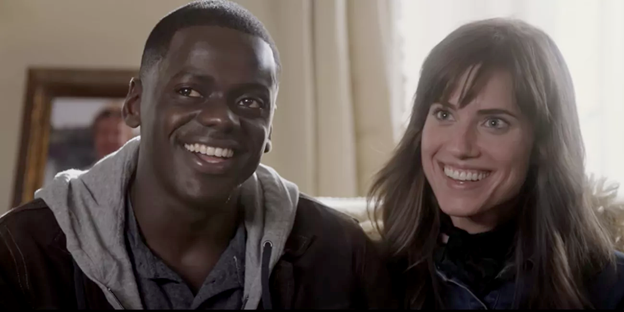
34. GET OUT / Jordan Peele / 2017
Genre: Horror
It’s hard to think of a more important moment in Oscar history than the moment Jordan Peele won best screenplay for GET OUT (…oh, well there’s LA LA LAND losing to MOONLIGHT, so I’ll settle for second). In his feature debut, Jordan Peele delivered an equally terrifying and hilarious look at racism—subtle and, well… not so subtle—in America. A horror film that reached extremely high critical acclaim, GET OUT is a stunning achievement that rewards its audience’s patience with strong setups and payoffs throughout its tight runtime. Every scene, detail, and performance is significant, with hidden layers and meanings that can only be caught after repeat viewings. Daniel Kaluuya’s performance is a career best, allowing the viewer to get sucked into his plight and see the world through the lens of a black man navigating the murky waters of US suburbia. GET OUT is a thought-provoking thrill ride that challenges the notion of a “Post-Racial” America, by showing that even the most socially aware people can still harbor racist views. [Daniel Brian Foster]
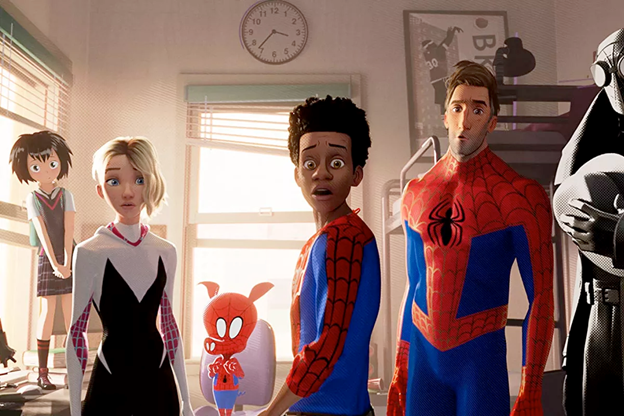
33. SPIDER-MAN: INTO THE SPIDERVERSE / Peter Ramsey, Bob Perischetti, and Rodney Rothman / 2018
Genre: Action / Superhero
And here we were thinking the Superhero genre was nearing extinction… From Sony Animation, and animation geniuses, Phil Lord and Chris Miller, SPIDER-MAN: INTO THE SPIDER-VERSE bursts at the seams with creativity, originality, and style. To think that the same studio that brought us THE EMOJI MOVIE would deliver one of the most visually lavish American animated features in years is basically unbelievable. It’s beautiful, fast, and effortlessly sheds baggage from less-successful iterations of the iconic story. Digging deeper into its comic roots, the film is animated like a graphic novel come to life, and even when ignoring the clout of its visual style, the film’s central character, Miles Morales, embodies the purity and bravery of the original Spiderman, adding a profound narrative to a whirlwind aesthetic spectacle. Along with an extremely fun (and funny) supporting ensemble, it’s all a blast, and one of the most striking studio films I’ve seen in a long time. Here’s to superhero films that feel fresh. [Sam Wall]
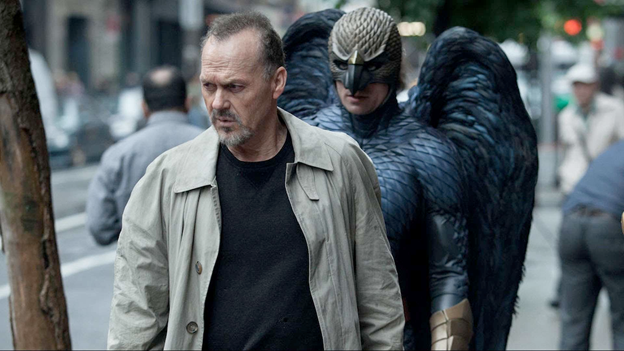
32. BIRDMAN / Alejandro González Iñárritu / 2014
Genre: Comedy
I am thoroughly burned out by “the oner” as a cinematic device. We’re at the point where movies are built around long takes, not the other way around, and our appreciation of the feat often metabolizes into praise for the shell of a film propping it up. Yet while the gimmick is very tired, it’s not hard to see why it caught on so heavily this decade. BIRDMAN was not the first movie to simulate continuous action, but remains the only one to justify it. Michael Keaton’s onscreen proxy Riggan is spiraling towards the ground at alarming speeds, and Iñárritu’s refusal to pump the brakes at any point allows you to actually feel the air rush past your face as you follow this life in freefall. Ed Norton complements Keaton in self-effacing pantomime, the volatile chemistry between them yielding some of the most lurid performances in this already masturbatory subgenre, but in this writer’s opinion, the real star here is Antonio Sánchez on the drums. BIRDMAN’s powderkeg of a one-man percussion section is perhaps its only element that has aged well; Lubezki’s mastery of the steadicam has unfortunately been aped to the point of parody, and the irony of Keaton going on to play an actual costumed bird is unreal, but to have seen this in theaters was the kind of movie magic that strikes only every other blue moon. [Ed Dutcher]

31. EX MACHINA / Alex Garland / 2014
Genre: Sci-Fi
What is so clever, and so insidious, about EX MACHINA is the number of levels of metatextuality it operates on. With three characters and one location, Garland’s script is a lean and efficient chamber piece, and it knows that, and it knows you know that, and it plays you time and time again for assuming the limitations of that. Explicitly about an engineer determining an android’s self-awareness, EX MACHINA gradually reveals itself to be a test in the audience’s own willingness to trust the images in front of them. Expectations are subverted, and those subversions are then turned on their heads. We see Alicia Vikander trapped in her cell and we feel for her, not questioning why she’s in there. We never think to be frightened for nebbish and naive Domnhall Gleeson, tapping against the glass of her enclosure. We root for him as the unlikely savior, not wondering about his motivations. Throwing the two together is the reclusive master of the castle; Oscar Isaac is a tour de force here, his career-defining heel-turn as an abusive tech bro constantly sucke- punching the viewer for thinking they’ve seen this archetype before. What does it say that we are so ready to trust any of these people after spending 100 minutes with them? EX MACHINA’s one mercy is that it doesn’t judge, but that doesn’t make the pill any easier to swallow. [Ed Dutcher]
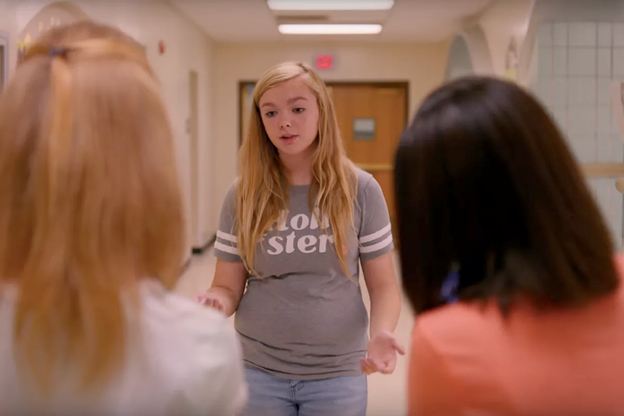
30. EIGHTH GRADE / Bo Burnham / 2018
Genre: Comedy
Upon release, the narrative surrounding EIGHTH GRADE quickly transitioned from it being a surprisingly intimate and informed look at middle school from a first-time-directing comedian to it being one of the most abjectly terrifying horror movies of the decade. That second narrative is far more compelling to talk and think about and, God willing, will become the film’s legacy. Even if trends and technology change, the film’s unbridled awkwardness and willingness to openly embrace the most uncomfortable moments of adolescence remains wholly universal. Even if you weren’t Kayla, the EIGHTH GRADE’s plucky but overly self-aware teenage protagonist, you knew someone like her. Kids are mean, parents are overbearing, acceptance is social currency, and the desire to be seen as an adult at that age is a cruel process that puts us in bad situations, and even if we can all acknowledge that those things are true, it doesn’t mean we want to relive them. Bo Burnham’s film captures those frightening truths perfectly, and even if you didn’t grow up with Snapchat or YouTube, the truth remains the same. It’s an electrifying watch that I hope to not experience again any time soon. [CJ Simonson]

29. DUNKIRK / Christopher Nolan / 2017
Genre: Action / Drama
I reviewed DUNKIRK when it first came out in 2017 and I still get pushback—not just for calling it one of the best WWII films in recent memory, but for calling it a good movie, period. But I get it. People go to the movies to escape from reality. It’s way more satisfying to imagine oneself as a superhero or a Rambo (never mind that he suffered from PTSD and ultimately committed suicide in the novel), not some nameless schmuck who drowns in three feet of water because he can’t get his pack off. No one wants to be shown a picture of himself cowering, shitting his pants in fear in the seconds before a bomb drops on his head for no good reason. That sucks! But that’s exactly why this is such a great and powerful film. It’s mainstream, blockbuster counterprogramming to the pop-propaganda machine we’ve been hooked into for the past several years. The world is going to Hell in a handbasket; perhaps it’s better to think about how we can save the greatest number of people rather than how many we can take out before they get us first. That is heroism, if you ask me. [Joseph Simpson]
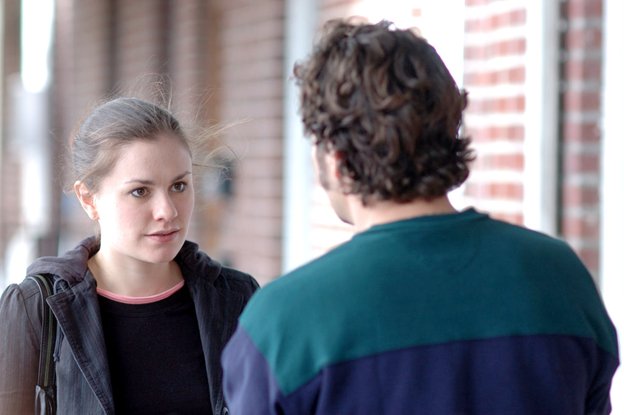
28. MARGARET / Kenneth Lonergan / 2011
Genre: Drama
Kenneth Lonergan’s masterpiece centered on a fatal bus accident and the girl who feels responsible for it is surprisingly comfy. Lonergan’s use of classical music throughout buoys scenes that may otherwise come across sardonic, and his characters are full people, silly, and awkward, and tragic, a hugely refreshing sidestep from New York archetypes. His dialogue is always surprising, dramatic yet realist; face it, he’s our best writer. MARGARET is not about how we are increasingly disconnected in the modern era, but about how disconnection is a fundamental aspect of human existence, that misinterpretations and assumptions and accusations are happening every second of every day in circumstances much less dire than the one Lisa (an astounding Anna Paquin) finds herself in. Seek out the extended edition: MARGARET was stuck in developmental Hell for four years (it was shot in 2007) and even then Lonergan was forced to cut over half-an-hour from the film. The extended edition comes close to Lonergan’s intended film, and only in that cut does Lonergan’s tapestried, symphonic vision of New York City come to life. [Luka Stojcic]
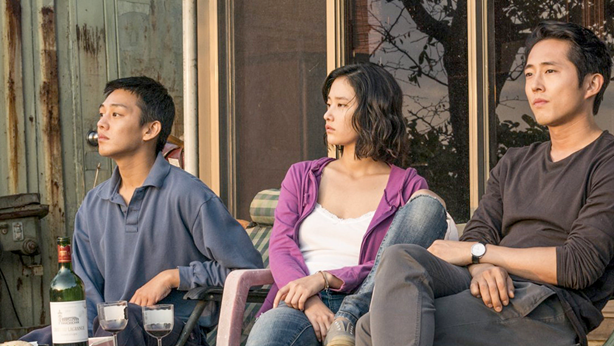
27. BURNING / Lee Chang-dong / 2018
Genre: Drama
For someone who griped about tackling THE IRISHMAN as long as I did thanks to its length, I certainly have seen BURNING a lot. To be clear, that’s more of a testament to Lee Chang-dong’s masterwork than a knock against Marty—this is a film that means more and more to me each time I see it, and one that I hope will overcome its comparative underdog status to be regarded as one of the decade’s best further down the line. In a decade that saw increasingly ham-fisted broadcasting of message and tone, BURNING is a most refreshing antidote, a film whose interpretations are virtually endless and range the gamut from political allegory to phantasmagorical thriller to literal murder-mystery. With pristine cinematography, revelatory performances from its central trio, and an ominous slow-burn that will have you questioning all past assumptions, BURNING unravels more and more of your heartstrings until you’re emotionally naked. But, even if I’ve said it before, it’s worth saying again—this was the first film I was motivated to message my friends to discuss and debate at length upon watching since the earlier half of college, and that alone brought me back to a time when there was nothing more magical than film and parsing through what it all could mean. [Thomas Seraydarian]
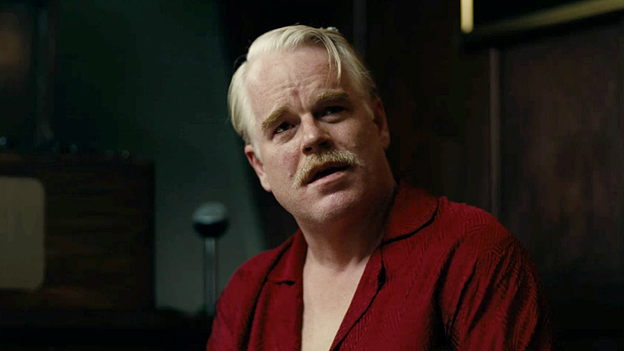
26. THE MASTER / Paul Thomas Anderson / 2012
Genre: Drama
A tale of a scholar and a savage, THE MASTER pits three of the greatest actors of our time in an ideological battle in postwar America. Joaquin Phoenix, in the role that he has since almost always reverted back to, plays Navy vet-turned-bumbling alcoholic Freddie Quell who finds wisdom in Philip Seymour Hoffman’s Lancaster Dodd, the head of a mysterious cult movement called “The Cause,” a somewhat veiled allusion to the Church of Scientology. The two initially connect on their love for booze, but Dodd takes an extra shine to Quell after conducting the processing interview he gives to all new members of his movement. The scene stands as one of the most powerful in filmmaking history as Dodd, imposing his will to find where exactly Quell’s aggression comes from, strips Freddie down to his most vulnerable state. Freddie then becomes steadfastly loyal to “The Cause” yet retains his anger, channelling it by viciously attacking Dodd’s critics. As the movement grows under the care of Dodd’s wife Peggy, played by the incomparable Amy Adams, she grows weary of Freddie while doing her own evaluations on him. Dodd and Freddie’s relationship is thus doomed, and seeing it all come down “on a slow boat to China” is nothing short of miraculous. [Alexander Ignacio Larios]
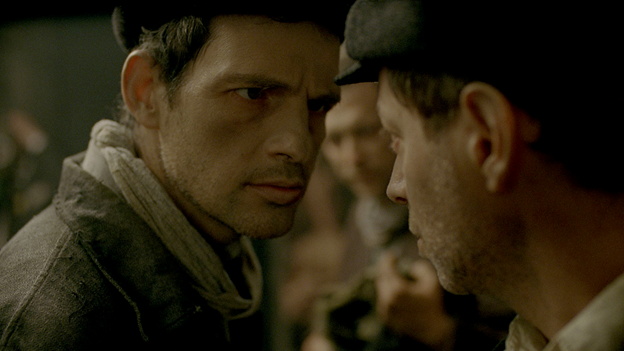
25. SON OF SAUL / László Nemes / 2015
Genre: Drama
We spend four-fifths of SON OF SAUL tracking tightly behind Géza Röhrig, locked into the inescapable realities of life in Auschwitz. The central conceit to László Nemes’ narrative is brutally effective; Saul is a sonderkommando, a man who works in the gas chambers killing fellow Jews, making him uniquely hated even in the camp. Despite his reviled position, Saul becomes convinced that he has found the body of his son in the pile of bodies he deals with, and does everything in his power to smuggle the body out of the camp to give it a proper burial. The twists and turns Saul takes as he navigates the bureaucratic horrors of the camp are almost too hard to believe; multiple times it feels as though Nemes has managed to render Hell on Earth to burn into your eyes forever. Images from the film rush through my mind every time I read about the concentration camps on our southern border. Whether we like it or not, our collective historical memories have become dependent on film, how we define the past is often determined by the films we share about it. SON OF SAUL is an essential part of the historical canon; it makes the realities of the Holocaust so visceral and personal that they can never be forgotten. Realizing the extent to which human beings were able to render this level of collective agonoy is something every single person should reckon with in their lives. As fascism has steadily consumed the world over the past few years, this film has become more and more relevant. We are staring down the barrel of something manifestly worse than the Holocaust as the threat of climate collapse becomes a reality and refugees are forced into camps. You have a moral obligation to confront our past so as to prevent a truly terrifying future. Of all the films on this list, SON OF SAUL is one of the few I truly believe viewers have a duty to engage with. [Carter Moon]
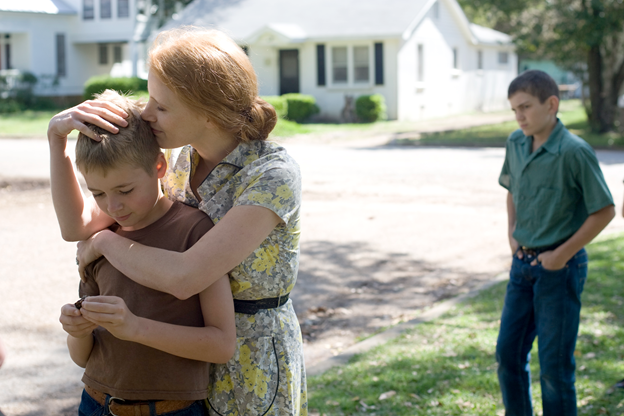
24. THE TREE OF LIFE / Terrence Malick / 2011
Genre: Drama
A film whose mighty ambitions compare and contrast the micro and the macro, a family in 1950s Texas and the Cosmos itself. The film that Malick built towards his entire career. A film that dares to cover the same territory as 2001: A SPACE ODYSSEY, and sometimes beat it at its own game (wonky CGI dinosaurs excluded). Though despite the sheer impressiveness of the 20-minute space and light show early on, it’s the smallest details that I remember. I still swoon at the thought of the summertime bliss that accompanies Couperin’s “Les barricades mystérieuses” when the kids dare to run out and play when they find out their father has gone away on a trip. I hazily yet fondly remember Brad Pitt buying a pound of brisket from a roadside barbeque and playing Brahms in the basement. Strengthened by its bold lack of plot, this film is a meditation to get lost in, perhaps one to watch in and out of a conscious state, but one to always remember and come back to as an essential cinematic text that strives to answer life’s big questions and succeeds in revealing everyday truth and beauty. [Reid Antin]
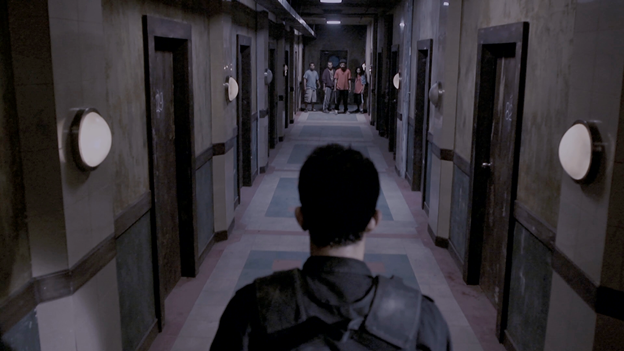
23. THE RAID: REDEMPTION / Gareth Evans / 2011
Genre: Action
A watershed moment and without a doubt the most influential martial arts flick of the last decade, THE RAID: REDEMPTION is not only responsible for everything from JOHN WICK to Netflix’s DAREDEVIL, but for finally moving the genre away from the shaky-cam trend that dominated the 2000s. The plot is simple: an off-the-books SWAT raid of a drug lord’s safe house goes sideways, leaving the survivors with no option but to fight their way out. There are a few twists here and there, presumably to make the story more interesting, but let’s be real, what more do you need than someone dismantling a machete gang with his bare hands? Moving at a breakneck (quite literally) pace, THE RAID is wall-to-wall action, featuring some of the most stunning fight choreography (none of that “bad guys waiting patiently for their turn to fight the good guy” nonsense) ever put to film. Every hit lands. You can practically feel every punch, kick, and slam. And no movement is lost to a quick cut or an out-of-frame camera movement. A tight, bloody-white-knuckler, it is simply exhilarating from start to finish. [Joseph Simpson]
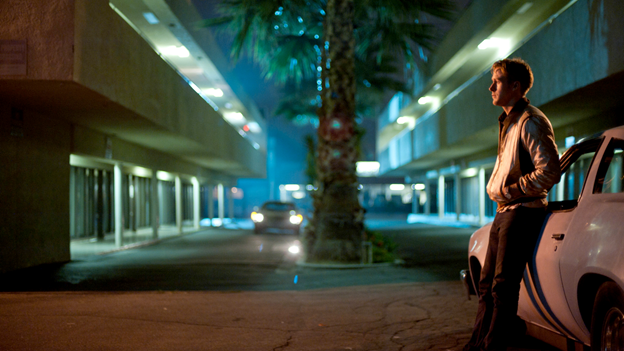
22. DRIVE / Nicolas Winding Refn / 2011
Genre: Drama / Crime
To the chagrin of many, Nicolas Winding Refn’s most (read: only) accessible film is not so much about driving as it is about what drives people. Set along the dingy backstreets and far-flung corners of Los Angeles, DRIVE is a modern fairytale about the distances between people, places, and things, and how those spaces, despite our best intentions, widen—or come crashing together. Ryan Gosling, referred to simply as “Driver,” mild-mannered mechanic/stuntman by day, getaway driver by night, is a cipher. But when a kind-hearted soul (a brilliantly understated Carey Mulligan) enters his life, so too does a schism. A slick, lurid portrait of not just the underbelly of LA, but the many masks of desperation, DRIVE is a love story told in long, wistful gazes broken by stilted dialogue and flashes of brutal violence. A story which, after things are done which cannot be set aright, leaves us with the lesson that sometimes the sweetest things in life are those that can never be, and that, just as often, the best thing we can do is to leave them be. [Joseph Simpson]

21. INCEPTION / Christopher Nolan / 2010
Genre: Action
Most of the films we see on theater marquees are shallow. Vapid. CGI fireworks that lack story, structure, and substance. But every once in a very long while, a gem comes along that makes you think. Really think. Which brings me to Christopher Nolan’s mind-melding journey into the id, INCEPTION. It’s more than bending Parisian cityscapes and frozen moments in time. It’s clever, without being condescending. The world is extremely developed and well-constructed, based in a reality not too far from our own. Where one can make careers out of interpreting and designing dreams, where no secret is safe, and where someone can destroy another person with a simple thought. The cast of characters are unique and fun. Tom Hardy shines as Eames, playing off of Joseph Gordon-Levitt’s Arthur. But it’s hard to play favorites when nearly every member of the cast sticks the landing. Ken Watanabe, Michael Caine, Ellen Page, Leonardo DiCaprio… together, they’re a symphony. Which is important in an ensemble picture that tracks six-plus characters. INCEPTION never feels like it loses any of them—they’re all equally important, with their own needs, wants, and arcs. And Hans Zimmer’s discordant, swelling score moves and haunts, complementing the action and the lows perfectly. It’s a slow-paced crescendo that climaxes with a question. Is this world real? Is your world real? I still spin tops, waiting for them to wobble and drop. Because you never know… maybe it really was all a dream. [Tracy Nicoletti]
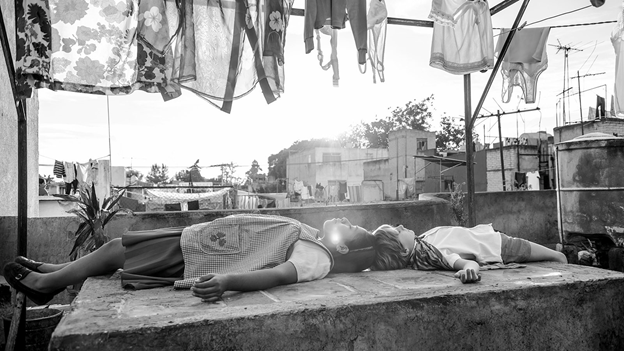
20. ROMA / Alfonso Cuarón / 2018
Genre: Drama
ROMA is a perfect movie because of what it’s able to capture without saying it directly. I can’t speak personally to the class dynamic in Mexico in the ‘70s, but I can speak to female relationships (even if it is only from my narrow, specific perspective). The loneliness, the sheer isolation that both women central to ROMA’s storyline feel because a man can walk away but a woman is trapped in her own body, her own biological imperative, is powerful. There’s a beat, right after Sofía has told her children their father isn’t coming home anymore as her family is sitting outside the restaurant, finishing ice cream cones, a boisterous wedding party in the background, where Sofía and Cleo share a look. It’s only a few seconds, but that look captures so much. The film opens on a four-minute scene focused on the ground of a courtyard as soapy water washes over it, the person cleaning out of sight. Cuaron is in no rush, valuing his characters over everything; we’re steeped in this world and everything it has to say comes from the characters. A perfect movie doesn’t mean it has no flaws. In this instance, a perfect movie means it executes something emotionally between the film and the viewer, even if it’s not the same for everyone. And ROMA without a doubt is about as emotionally engaging as you can get. [Tapley Eaton]
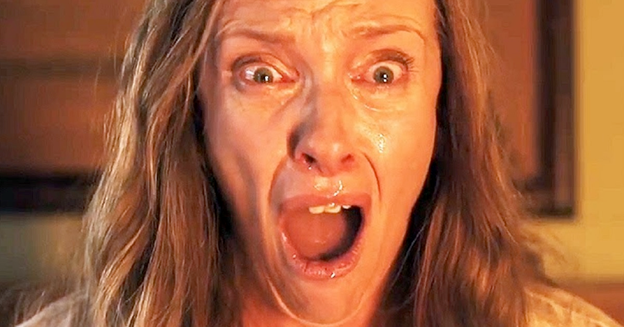
19. HEREDITARY / Ari Aster / 2018
Genre: Horror
The 2010s, thankfully, were an era that engendered a new perception of horror, and more specifically how to scare people. Eerie, invisible forces that instill fear replaced jump scares. No one is a greater patron of this notion than director Ari Aster. Aster’s debut film, HEREDITARY, was the word on everyone’s lips in 2018 as the virtually unheard-of director had us shitting our pants. I am in wholehearted agreement with the general public in that HEREDITARY is a breath of fresh air, although, for me, it’s not just the way he controls when Toni Collette is visible in the dark parts of the frame, or his massive expanses of grief in one audible shot. No, what reigns supreme above all is the idea of sealed fate. The idea that no matter what these characters do, no matter the decisions they make, they will face immense tragedies either way. While this tenant is one that could be seen as perpetuating a God complex in Aster, what feels more accessible is to see him as the ultimate puppet master, just waiting for the lynchpin for his tragedy of predestined errors to begin. It’s rare to find a film, much less a director, that is able to keep their audience so engrossed, yet so bewildered, as to what will happen next, but somehow Aster is fully comfortable making a habit of it. [Jesse Herb]
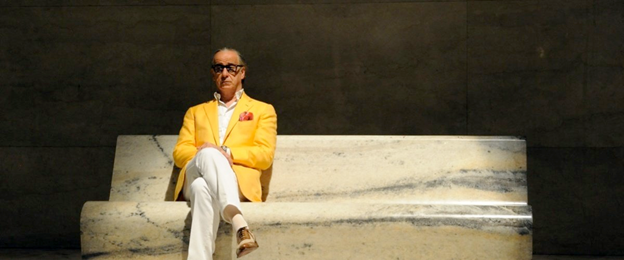
18. THE GREAT BEAUTY / Paolo Sorrentino / 2013
Genre: Drama
“What should I be worried about?” “Only what’s on the menu.” There is so much to be said about THE GREAT BEAUTY. Scale. Opulence. Decadence. It’s a film that wears its key inspiration on its sleeve, but Fellini aside, Paolo Sorrentino’s greatest achievement is his multi-functionality. THE GREAT BEAUTY is as much a comedy as anything else, and this self-awareness greatly enlivens its profundities. It’s a love letter to Italy, sure, but it’s one that is delivered with a smile on its face. A love letter written by a man who has accepted that Rome will continue to live long after he is six feet underground. It’s an embrace of mortality, and a celebration of age, a festive dance to remind us that our arthritis should never keep us from getting out of bed in the morning. Life is short, sex is fast, but Rome is timeless. It’s sexually alive and feverishly cheers on a culture that will forever remain a melting pot of culture. THE GREAT BEAUTY is as much a sensory experience as it is a religious one. A trip through time, both in the eyes of history and age. It is, by all accounts, a masterpiece. [Sergio Zaciu]
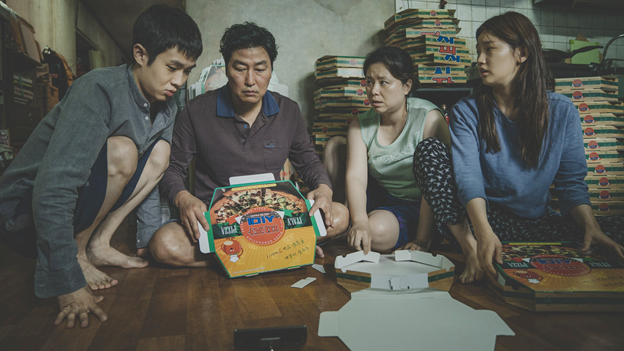
17. PARASITE / Bong Joon-ho / 2019
Genre: Comedy
In a perfect world, every screening of PARASITE would exit into a revolving door leading you into another immediate viewing of PARASITE. While I left my initial screening shaking with excitement from being jostled in Director Bong’s funhouse, my second viewing months later cracked open the picture’s potent, unkempt sadness. The invisible line separating rich and poor, beyond capital itself, is the rotten stench the upper class ascribes to its workers. A mind is not a presence, but the trailing smell left on novo-modernist furnishings is what distinguishes the men from the animals. Mr. Park’s act of bloodshed in the film’s finale is shocking, but inevitable; it’s the hairline fracture that broke the camel’s back. The survivors of PARASITE come to the conclusion that, even after the indignities and degradation, the only solution to their plight is to become millionaires. Billionaires, if they can dream it hard enough. This film is one brutal motherfucker, and a polished synthesis of Bong Joon-ho’s oeuvre of angry, Western-influenced genre cocktails that all set their sights on a similar foe: tribalism and the imperialist West. PARASITE hits as hard as it does because this South Korean auteur was primarily inspired by the movies we deem as sacred fantasies—slicing them open to scoop out and rearrange the innards is the name of Bong’s game. [Kevin Cookman]
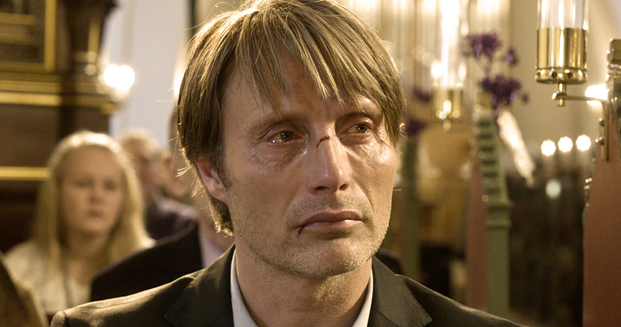
16. THE HUNT / Thomas Vinterberg / 2012
Genre: Drama
Without fail, THE HUNT is a film that makes me physically ill every time I watch it. There are no winners in Vinterberg’s unfairly lethal assault, telling the tale of a kindergarten teacher wrongfully accused of pedophilia who is broken down and down and down once again by his former friends and community members. Filmed with a paranoid panache that ratchets up the rapid unraveling of its protagonist’s quiet life to nearly unbearable levels, THE HUNT is nowhere close to an enjoyable film in the traditional sense of the word, but one that everyone deserves to subject themselves to at least once. To address the elephant in the room: is this a more complicated watch in the post-#MeToo era than it was in 2013? Of course. But I would argue that the text has become more layered, ambiguous, and devastating as a result. The fact that we’re inclined to root and sympathize for a man we know we would align against if the same thing happened in our own social circles is a queasy bit of self-reflection that makes THE HUNT all the more unforgettable. There are few films that I hate as much as I love, but THE HUNT is one of them, and is probably my personal pick for the film of the decade. [Thomas Seraydarian]
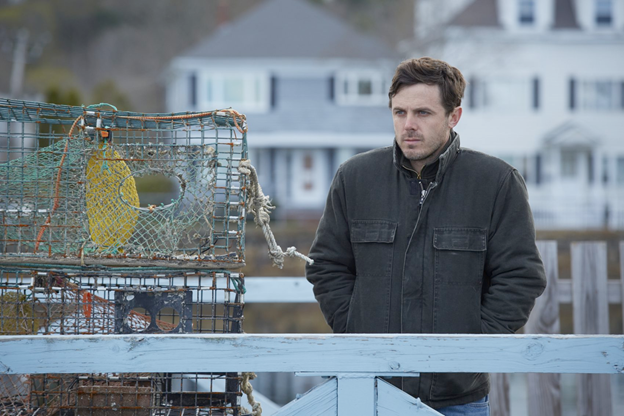
15. MANCHESTER BY THE SEA / Kenneth Lonergan / 2016
Genre: Drama
Truly great filmmakers understand that their real tool is time. The ability to transform an audience’s perception of the progression of time is the real magic of film. Time is an immovable force, but occasionally it can be a great blessing, healing simply by its refusal to stop moving. In MANCHESTER BY THE SEA, no other film from this decade so poignantly captured the pain of the past and how it can define our present, and how the inevitability of a future compels us forward into a new, better form of life, whether we like it or not. The emotional scars cutting through this film will never disappear, but Lonergan shows us how they might one day turn to calluses. The unending drive to keep being propelled forward in time, despite whatever cruelties the past may have bared down upon us, is the great uplifting hope of this film: an indomitable testament to the human spirit that we should all be grateful to share in. [Carter Moon]
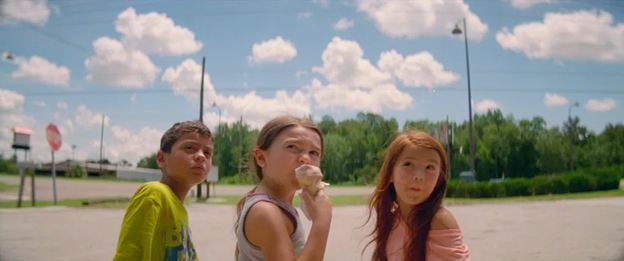
14. THE FLORIDA PROJECT / Sean Baker / 2017
Genre: Drama
It’s an incredible feat to make something so quiet and intimate feel so unforgettably significant in the long run. Looking back, THE FLORIDA PROJECT has burned into my memory like few films I’ve seen, propelling the viewer into the lives of people whose existence many of us ignore in our own day to day. The contrast between the sugary colors of the rundown housing surrounding Disneyworld and the struggles of the low-income people living inside serve as a fascinating backdrop for a story about childhood. Six-year-old Moonee still sees the world with wonder even though in many ways she’s been forced to grow up too fast. We see this story through her eyes, told without a hint of condescension or pretense, with an honest portrayal of poverty that Hollywood often denies us. THE FLORIDA PROJECT is an unflinching look at the community it captures, and its child’s eye view connects us to the story in a way that is profound and lasting. [Nadia Hayford]
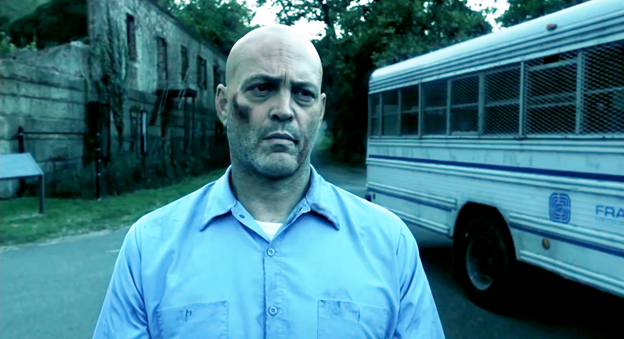
13. BRAWL IN CELL BLOCK 99 / S. Craig Zahler / 2017
Genre: Drama / Crime
Following a 6’5” skinhead brute forced to reckon with the obsolescence of the narrow path, BRAWL IN CELL BLOCK 99’s monolith of grime amidst the rising popularity of ‘80s revivalism was a sign that genre nostalgia could be done not only right, but meaningfully. Vaughn’s dramatic turn as a walking-talking woodchipper is magnetic, his esteemed history as comedy’s loudest oaf peeking out of the character’s scalp tattoo in his many moments of “I couldn’t help myself” caustic wit. It’s the unrestrained ethos of the whole film—over two hours of bashfully foul violence. Even the pawns are given pages upon pages of backstory. On a fifth viewing, I picked up from a blink-and-you’ll-miss-it exchange that Vaughn and Carpenter’s characters had sworn themselves to sobriety together. Also, they’re possibly quite racist. Its characters are ugly, irredeemable even, but more realistic than many would care to admit. There’s a COMMANDO element of catharsis in Zahler’s jailhouse massacre—the seemingly fantastical stakes become a reality through process and heedlessly batshit, imperiling perseverance. Many action films see the protagonist make their grand sacrifice in the finale, but Vaughn’s burly Bradley signs his life away to save his wife and unborn child the moment he’s assigned a mission to save them. In a morally murky, nebulous, even insane way, it’s… Kind of romantic? [Kevin Cookman]
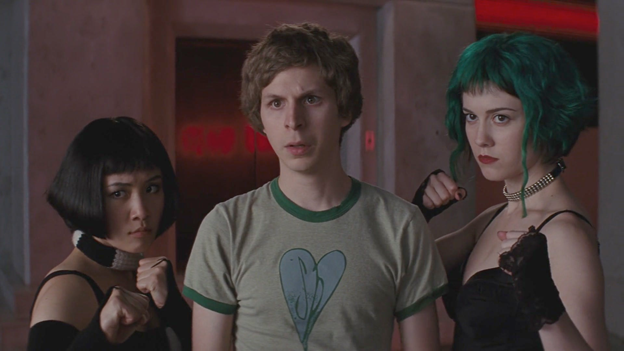
12. SCOTT PILGRIM VS. THE WORLD / Edgar Wright / 2010
Genre: Comedy
I’ll say it! SCOTT PILGRIM VS. THE WORLD is the best comic-book-to-film adaptation ever made! It could only take the dazzling mind of Edgar Wright to fully capture the sheer kinetic charm of Bryan Lee O’Malley’s hit comic. Even after fans decried the casting of Michael Cera as the titular character, he proved them all wrong. When nerdy, loser Canadian Scott falls for American expat-turned-extra-dimensional delivery girl Ramona Flowers, he’s challenged to fight every one of her exes each more powerful than the last. Yes, it’s silly and it’s quirky; however, Wright knows how to turn it into a genuinely fun romp from top to bottom, which makes it oh so tragic that it flopped when pitted against EXPENDABLES at the box office, but do you see that movie anywhere on this list? The recent alt-right stink piece claiming SCOTT PILGRIM “ruined” our generation, if anything, proves that it thrives in the collective cultural conscience of even those who despise it to this day. [Alexander Ignacio Larios]
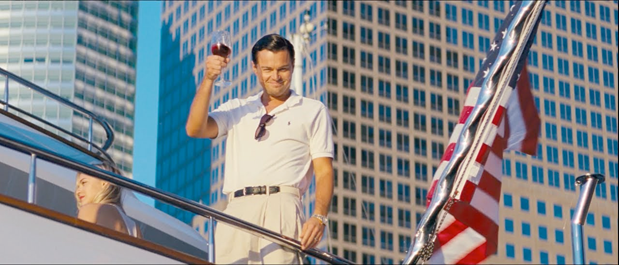
11. THE WOLF OF WALL STREET / Martin Scorsese / 2013
Genre: Comedy
The fact that collegiate meatheads see THE WOLF OF WALL STREET as inspiration is somewhat part of its genius. You see, this is the teeming, fetid underbelly of America’s implicit obsession with tacky Nouveau Riche ostentation writ large and unapologetically. But those willing to write off THE WOLF OF WALL STREET on those grounds seem to be missing the forest for the trees. Pornographically realized, DiCaprio’s Jordan Belfort doesn’t want to change, doesn’t change until forced to at the gunpoint of the court, and has no qualms about the lives he ruined along the way. But therein lies the winning hand: making this a morality tale would be too cushy. What THE WOLF OF WALL STREET does, more than anything with a more distinct sociopolitical message, for my money, is demonstrate that the one-percenters of the world will always come out on top and often get off scot-free. Jordan Belfort is still out there making money and presumably happy as a clam right now. By showing the mind-melting blackhole of nihilistic capitalism in a way that doesn’t make a ham-fisted point to debase it, the far more impactful resonance can be felt. The guy next to you in line at the grocery store could be the next Jordan Belfort. Hell, he probably wants to be the next Jordan Belfort. Isn’t that the more harrowing conclusion? Besides, that McConaughey cameo… c’mon man. [Thomas Seraydarian]
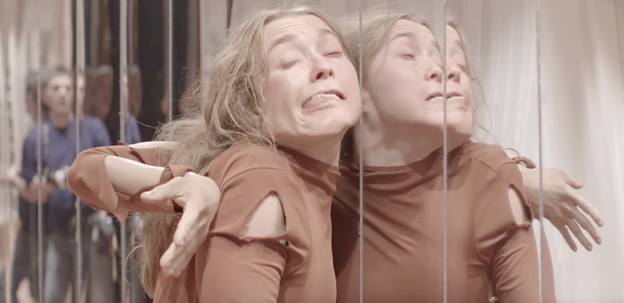
10. SUSPIRIA / Luca Guadagnino / 2018
Genre: Horror
It is to Luca Guadagnino’s undying credit as a director that the same guy who put out the sun-dappled serotonin generator that is CALL ME BY YOUR NAME was (within a year!) able to follow up with the most stomach-churning horror spectacle of the decade. SUSPIRIA is revolting on a number of levels, from the mind-boggling prosthetics and gore to its pointed themes on gender and politics, and yet beneath it all, there is still the same warm heart beating that could be felt in that aforementioned Italian summer romance. Yes, SUSPIRIA is a horror film that uses the language of the Cold War to communicate its message, but it is also ultimately a film about unshakable bonds held by sisters, mothers, wives, and daughters. There’s an unmistakable femine energy pulsing throughout SUSPIRIA, one that a male director best known for a movie about the relationship between two men could have easily fumbled. I left SUSPIRIA on shaky legs, struggling to comprehend what I just saw. For all the film’s sturm und drang, Guadagnino decides to end it on a disarmingly tender note, offering the audience a depiction of a love so terrifyingly ferocious that it ends up reassuring us in its sincerity. I don’t enjoy watching this movie—it’s too frightful to give it that—but I am thrilled by it in ways no other film this decade has been able to match. [Ed Dutcher]
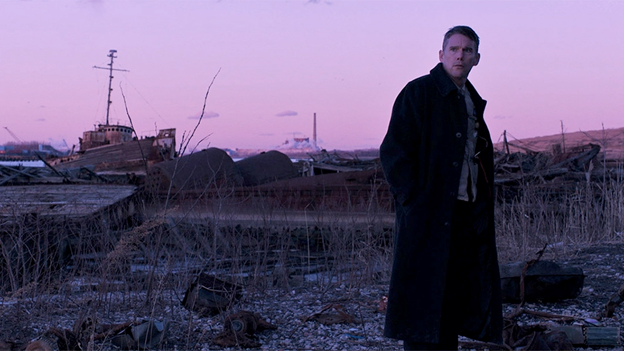
9. FIRST REFORMED / Paul Schrader / 2017
Genre: Drama
Of the similarities between his works, Paul Schrader has said that his characters represent the same person at different points in his life. So, gone is the sickly, stagnant sex and brooding violence of his early years, coiled like a serpent, as is the rampant egotism. In its stead are the thoughts and simple gestures of a man of a hard-won sincerity and kindness. Reverend Ernst Toller (Ethan Hawke) is the sole pastor of the First Reformed Church, now little more than a tourist trap overshadowed by a corporate megachurch nearby. Even so, he carries on in his duty, tending to his meager flock as he faces his own crises. The penitent life may be hard to grasp, but it’s as simple as having the strength to deny oneself that which others take for granted. To not only hold one’s pain to his chest, but to take on the pain of others, willingly and without complaint, requires tremendous courage. But what of that of the whole world? A world dying due to the malfeasance of others. What is one to do? I’m not sure if whether or not God will forgive us is the question, but will our children. [Joseph Simpson]
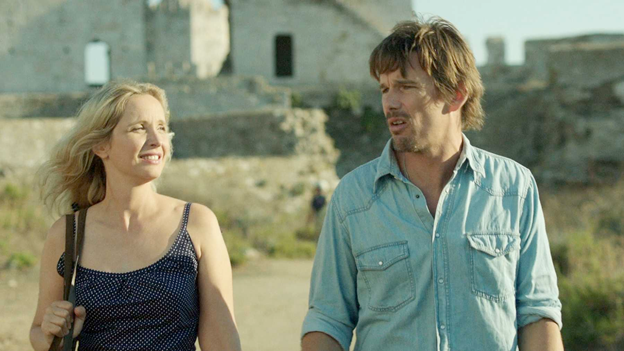
8. BEFORE MIDNIGHT / Richard Linklater / 2013
Genre: Romance
Linklater films are a test in patience to say the least, and those who pass the test are ultimately rewarded. The BEFORE films are a prime example of this, with nine years between each release and wide-open endings thirsting for pay-off in the first two films. In this third and possibly final installment, we were treated to the most fitting progression of characters Jesse and Celine’s whirlwind relationship. For those who grew up with these films, BEFORE MIDNIGHT teaches us that there are no happy endings. Not in a bleak nihilistic way, but in a way that reminds us that even the most successful relationships require their participants to accept a degree of frustration and resentment that may never go away. The dream-like nature of its predecessors BEFORE SUNRISE and BEFORE SUNSET is mostly gone, but somehow the tone remains consistent. Not to mention, lead actors Ethan Hawke and Julie Delpy’s chemistry remains more natural than anything you’ve ever seen. No word yet on if there will be a fourth installment of the series; regardless, it has ended beautifully. I guess we’ll see in 2022. [Nadia Hayford]
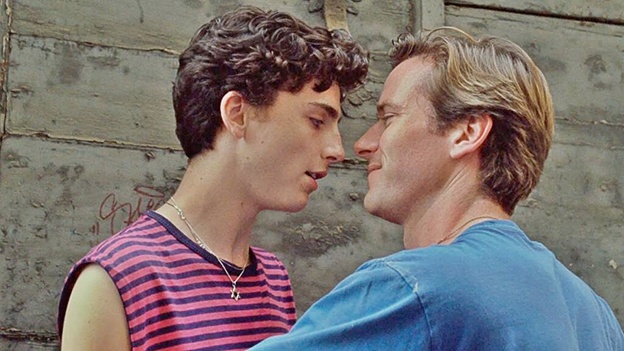
7. CALL ME BY YOUR NAME / Luca Guadagnino / 2017
Genre: Romance
This film is entirely beautiful. The people are beautiful, the landscape is beautiful, the cinematography is beautiful, and a particular dance scene is awkwardly beautiful (but still beautiful). Some of the film is meandering and confusingly lingers on seemingly unnecessary shots of meals or sunlit paths, but when the film nears its end, these moments piece together as an extraordinary tapestry of love. It’s in these smaller moments that one is able to participate in the idea that two people can slowly build a connection in a single summer. For two supposedly straight male actors, Timothee Chalamet and Armie Hammer have palpable chemistry, and Michael Stulberg gives one of the best film monologues in recent memory. CALL ME BY YOUR NAME is one of those films that hits on something raw and true in the human experience, which is often so incredibly hard to find. Love is love, and none are excluded from the ecstasy and magic that comes with it. [Sam Wall]
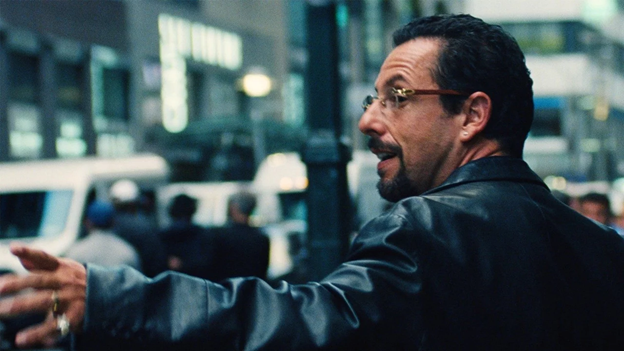
6. UNCUT GEMS / Josh and Benny Safdie / 2019
Genre: Thriller
Rarely have I ever sat in a movie theatre and thought to myself “Wow, this movie is going to adorn dorm room walls for the next 15 years.” Josh and Benny Safdie’s GOOD TIME follow-up, UNCUT GEMS is the FIGHT CLUB of the 2010s, a seminal film ignored by the Academy Awards, but near and dear to the hearts of the viewers who matter most: young people. It’s a film so aggressively hip and modern that its alienating qualities only make it more cool, truly the most punk rock film of the decade—the closest thing I’ve seen this millenium to capturing the immersive magic of Elaine May’s MIKEY & NICKY. There are so many praises I could pile onto UNCUT GEMS. Not since MARGARET have I seen such an acutely “New York movie.” Not since 4 MONTHS, 3 WEEKS, 2 DAYS have I seen such a visceral and unflinching moment-to-moment thriller. And to top it all off, it just might be the best film about Jewish families ever made. Adam Sandler’s star-turn as jeweler Howard Ratner, though not in any way surprising to those familiar with his dramatic chops, is the type of performance that goes down in the annals of history right beside the Travis Bickles of the world. It is a Cassavetes freakshow inside a derelict urban amusement park and impossibly “New York”—perhaps only an Abel Ferrara cameo away from exploding the projector. [Sergio Zaciu]
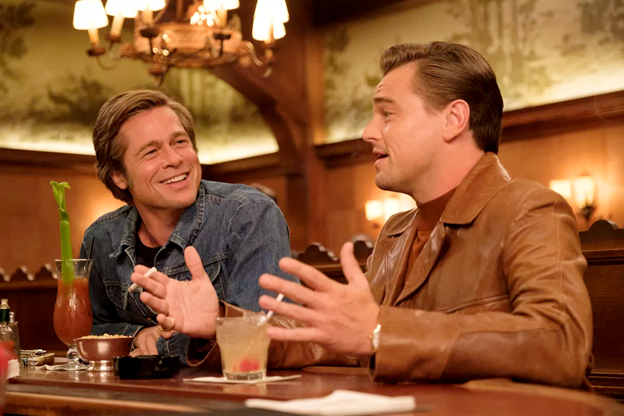
5. ONCE UPON A TIME IN HOLLYWOOD / Quentin Tarantino / 2019
Genre: Comedy
After eight-and-a-half viewings, I am still peeling back the infinite layers of celluloid used to craft this oil painting immortalizing the year 1969. Tarantino’s least plot-driven film is also quite possibly his best (still duking it out with INGLOURIOUS BASTERDS), and certainly his most ambitious. Unshackled from story, one feels compelled to revisit it again and again to simply inhabit the most richly detailed cinematic world of the decade (one only possible when our greatest living filmmaker gets everything he wants from a studio budget). As enforced by the copious eye-of-God crane shots on display, Tarantino has the creativity of a little boy as he plays with his life-sized action figures; his respectively real and imagined Lancer and Bounty Law playsets; his whole toy chest full of dreams and memories manipulated to change the course of history itself. He reminds us that cinema is the ultimate wish-fulfillment tool—to not only create in art what we cannot in real life, but to also remind us what makes life worth living: Going to a lazy afternoon movie at the Bruin; enjoying margaritas at Casa Vega; driving around listening to Neil Young; huddling around the campfire of television with your buddy and laughing at an otherwise disposable piece of content. Essentially, a portrait of what it means to live in LA then and now. [Reid Antin]

4. FORCE MAJEURE / Ruben Östlund / 2014
Genre: Comedy
Beginning with the literal butting of spousal heads while linking the uniformity of performative compassion with rows of four-star wood-paneled resort suites, FORCE MAJEURE initially bombs a clean slope of gender subversion, but after all these years, it hits so much harder as a showcase of micro-inhumanities; like, perfectly encapsulating how many speak to one another in canned phrases that function to communicate “Let’s end this social transaction,” and little more. One of cinema’s greatest inciting incidents, the marvelous avalanche sequence, is scuttled away with one of the most jaw-dropping excuses for an act of evil: “Is it even possible to run in ski boots? Come on.” Come. On. Every scene is a divine escalation of morbid truths, Östlund’s noxious skewering of the polite facade materializing deeper cracks in faux-niceties of charm and composure. The most unstable power is the one most defensively claiming they’re the most stable. Nipping and exhuming in steady spurts, only revealing the anxious cyst it left behind years after an initial viewing, FORCE MAJEURE’s refreshingly bleak lack of sympathy provides psychological insight like few other pictures in a decade dedicated to hollow uplift. These are the dregs. You are the dreg. To directly engage with Östlund’s sinisterly woven moral conundrums is to dilly-daddle as much as these emotionally inept tourists—that others are trusted with a couple’s trauma and immediately engage in “Wow, what would *I* do?” debates is the film’s not-so-secret, yet under-the-skin indictment of the absorbed self. [Kevin Cookman]
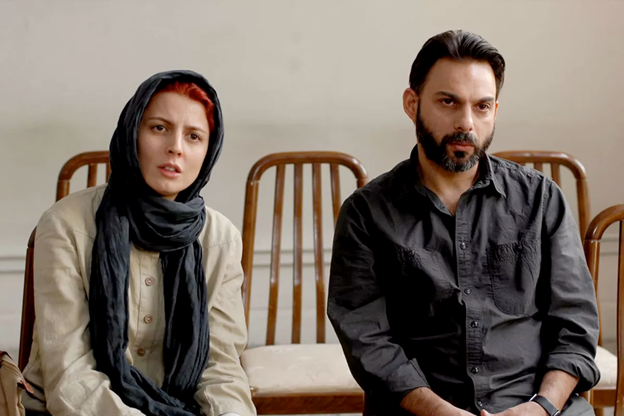
3. A SEPARATION / Asghar Farhadi / 2011
Genre: Drama
An intensely intimate portrait of an Iranian family falling apart, Asghar Farhadi’s A SEPARATION still stands as his best work. Married couple Nader and Simin are at odds when Nader, worried that no one will take care of his Alzheimer’s-suffering father, refuses Simin’s request to move out of Tehran so that their daughter Termeh may thrive elsewhere. The conflict pushes them to file for divorce, which is more than just a difficult process in the Iranian courts. A houseworker named Razieh is then hired by Nader to care for his father, but unbeknownst to him, Razieh is hiding her pregnancy to secure the job. It’s a mortifying journey that pretty much every character goes through, but it’s hard not to stick with them through it to that brutal, unceremonious ending. It goes without saying that the emotion in the film easily transcends cultural borders and gives an accurate portrayal of Iran and the Iranian people that showcases how their systems and anxieties are not at all dissimilar to our own. [Alexander Ignacio Larios]
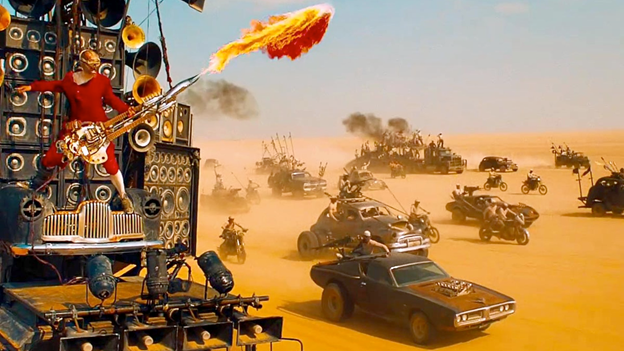
2. MAD MAX: FURY ROAD / George Miller / 2015
Genre: Action
Any revival that makes me consider retroactively watching a M*l G*bson film is a feat to be celebrated in and of itself. Even violent, anti-Semitic misogynists couldn’t spoil George Miller’s MAD MAX: FURY ROAD, which is best described as the underdog darling in an “Age of Sequels.” The release of the trailer for MAD MAX: FURY ROAD was greeted with the same skepticism, however, as any other remake/sequel of this decade, and yet much to everyone’s surprise and enjoyment, Miller’s opus was completely different! Here, Miller shows off his expert writing skills by way of minimalism. Essentially, when put under a microscope, MAD MAX: FURY ROAD is a two-hour-long car chase. The characters spend ¾ of the movie going somewhere and ¼ going back, and that’s the trajectory. It is the carefully curated bits of exposition that make the film so undeniably successful. Miller wastes no time with dry recap of Max’s backstory, or unnecessary information like why Furiosa doesn’t have an arm, he just shows the mythos in a digestible yet efficient way. Any other facts can be garnered on second, third, or 10th watch; and with Miller’s gorgeous cinematography and in-depth world building, you will want to. MAD MAX: FURY ROAD is a rare gem that shows all the capabilities of what simple, good storytelling can achieve. [Jesse Herb]
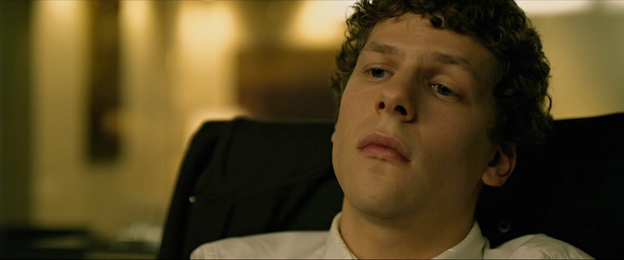
1. THE SOCIAL NETWORK / David Fincher / 2010
Genre: Drama
THE SOCIAL NETWORK could be about any social media site. Hell, THE SOCIAL NETWORK could be about Vine. But at its core, the David Fincher masterpiece is about the most primal human experiences: love, betrayal, revenge. A technical masterpiece that tricks you into believing this is a story about technology. This is a story about male privilege, the toxicity of the self-proclaimed “beta male,” and the sneering pride of the powerful rich men who (as is more obvious than ever) control the vast population of society as we know it. THE SOCIAL NETWORK is about the power imbalances of friendship on a global scale, how the vitriol that one nerd harbors can change the global landscape of technology as we know it, yet isolate him from his most sacred relationship. It is ahead of its time in every way, down to Rooney Mara staring down the camera and saying “You’re going to go through life thinking that girls don’t like you because you’re a nerd. And I want you to know, from the bottom of my heart, that that won’t be true. It’ll be because you’re an asshole.” A deeply dissatisfying story compacted into a deeply satisfying film, from Trent Reznor and Atticus Ross’ score to Kirk Baxter and Angus Wall’s edit to the sickly color palette to Justin Timberlake’s twisted face as he flinches away from Andrew Garfield’s extended fist. THE SOCIAL NETWORK is a once-in-a-lifetime kind of production, a collaboration of artists at the height of their skills, presenting a centuries-old story to the post-modern audience. It redefined film of the 21st century and defined the decade 10 months after it began. We are so lucky to live in a post-SOCIAL NETWORK world. “Good luck with your video game.” [Aya Lehman]


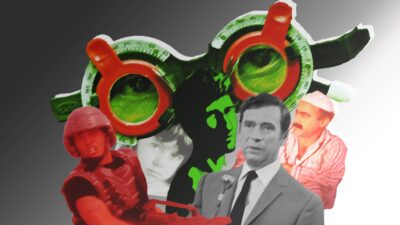
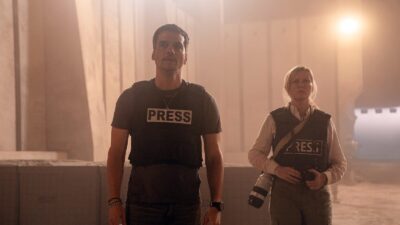
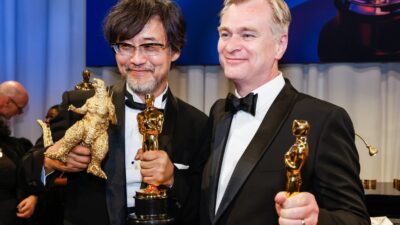




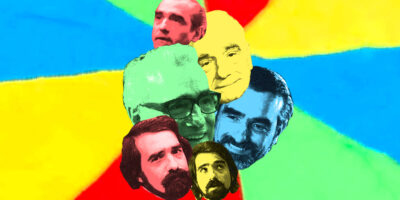
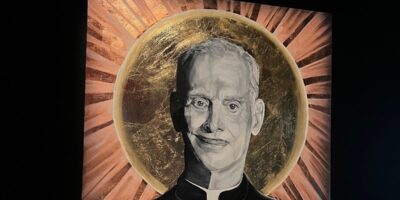





Comments